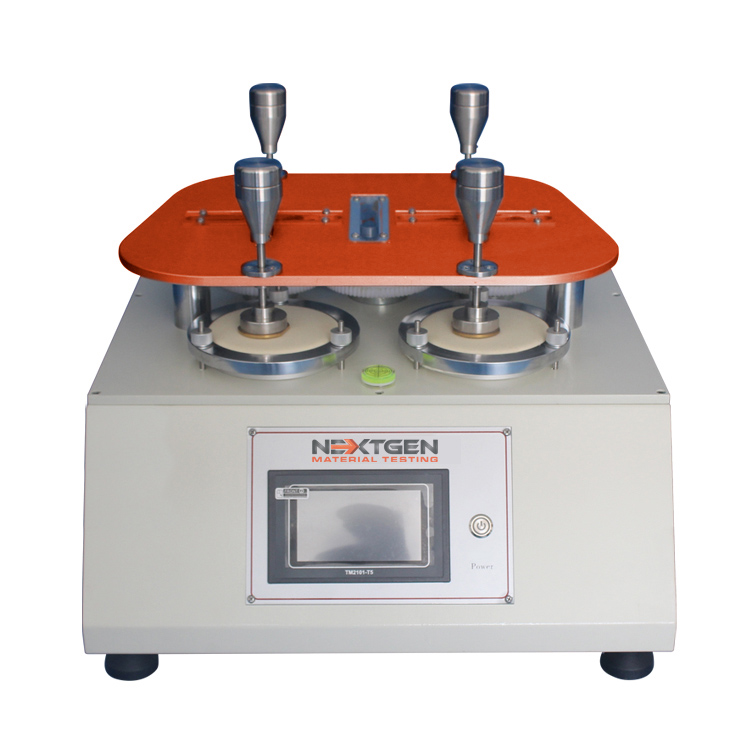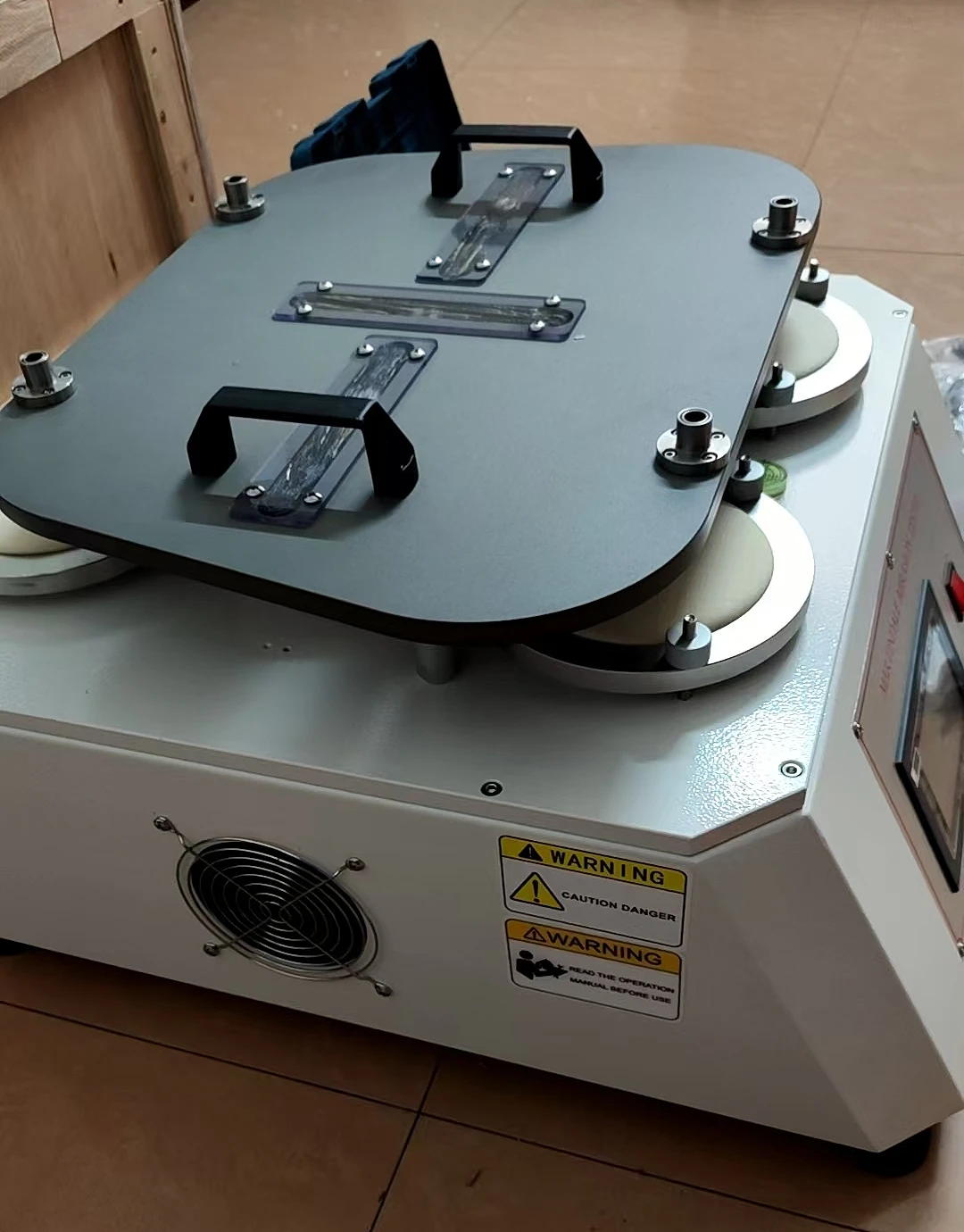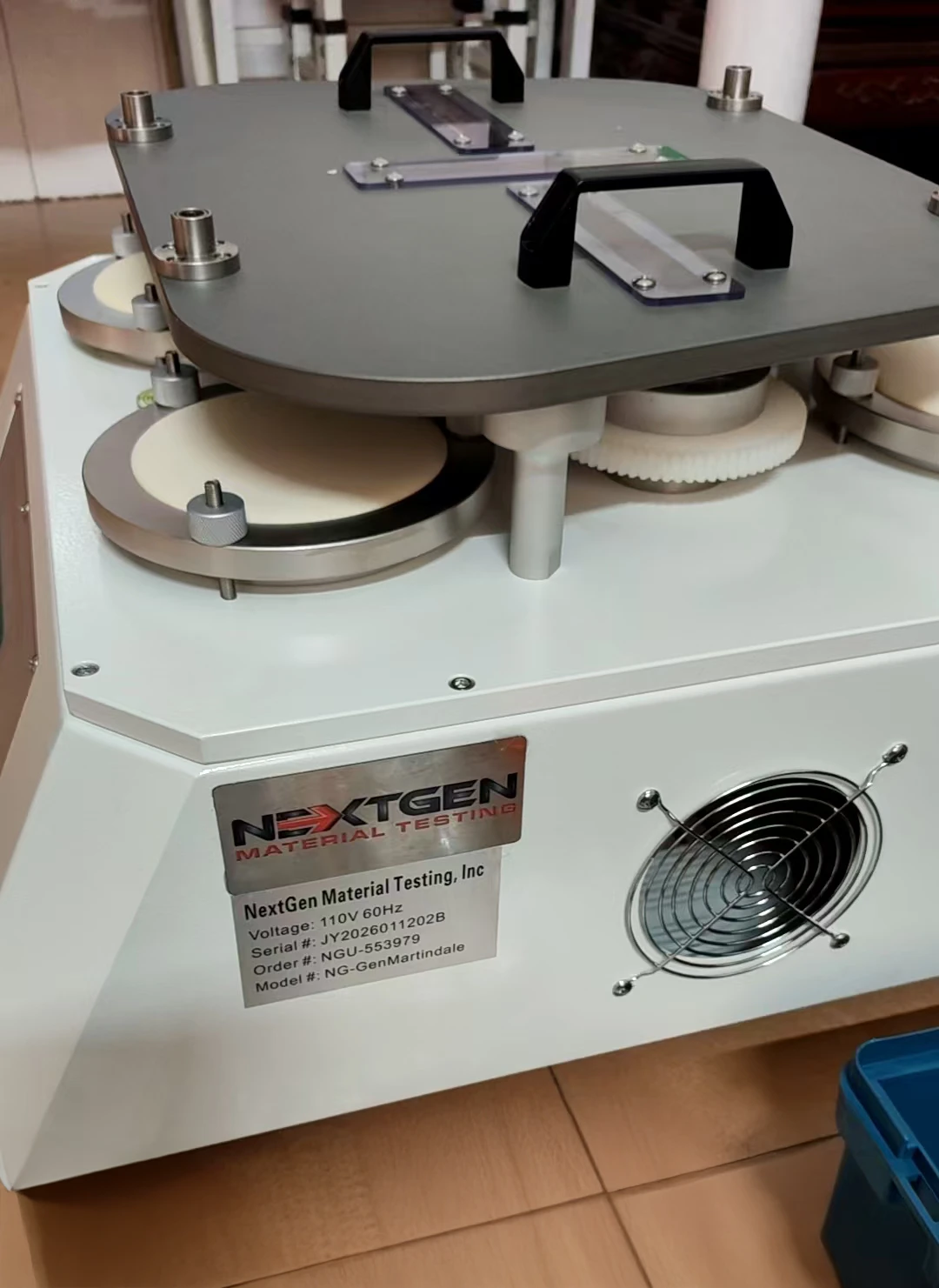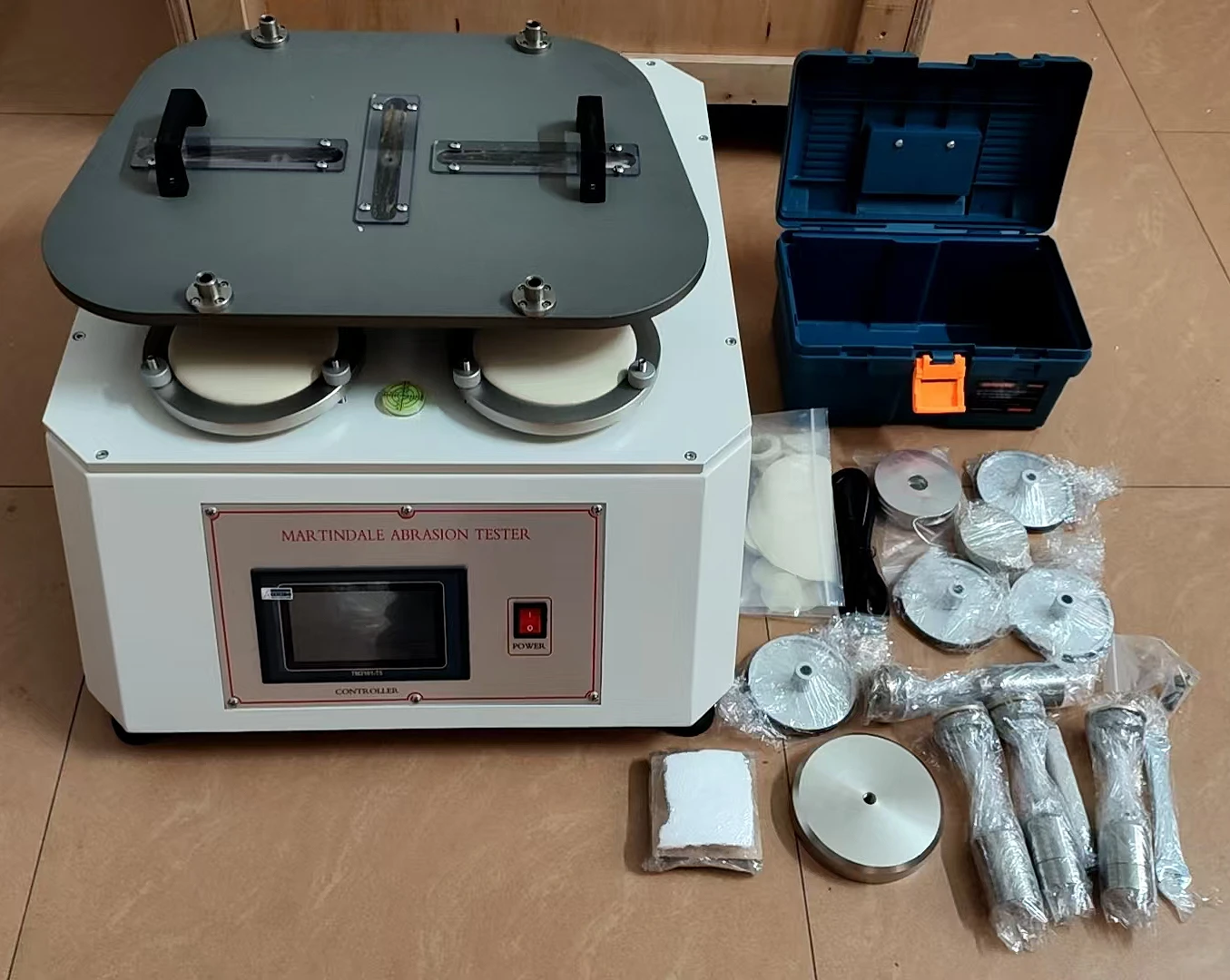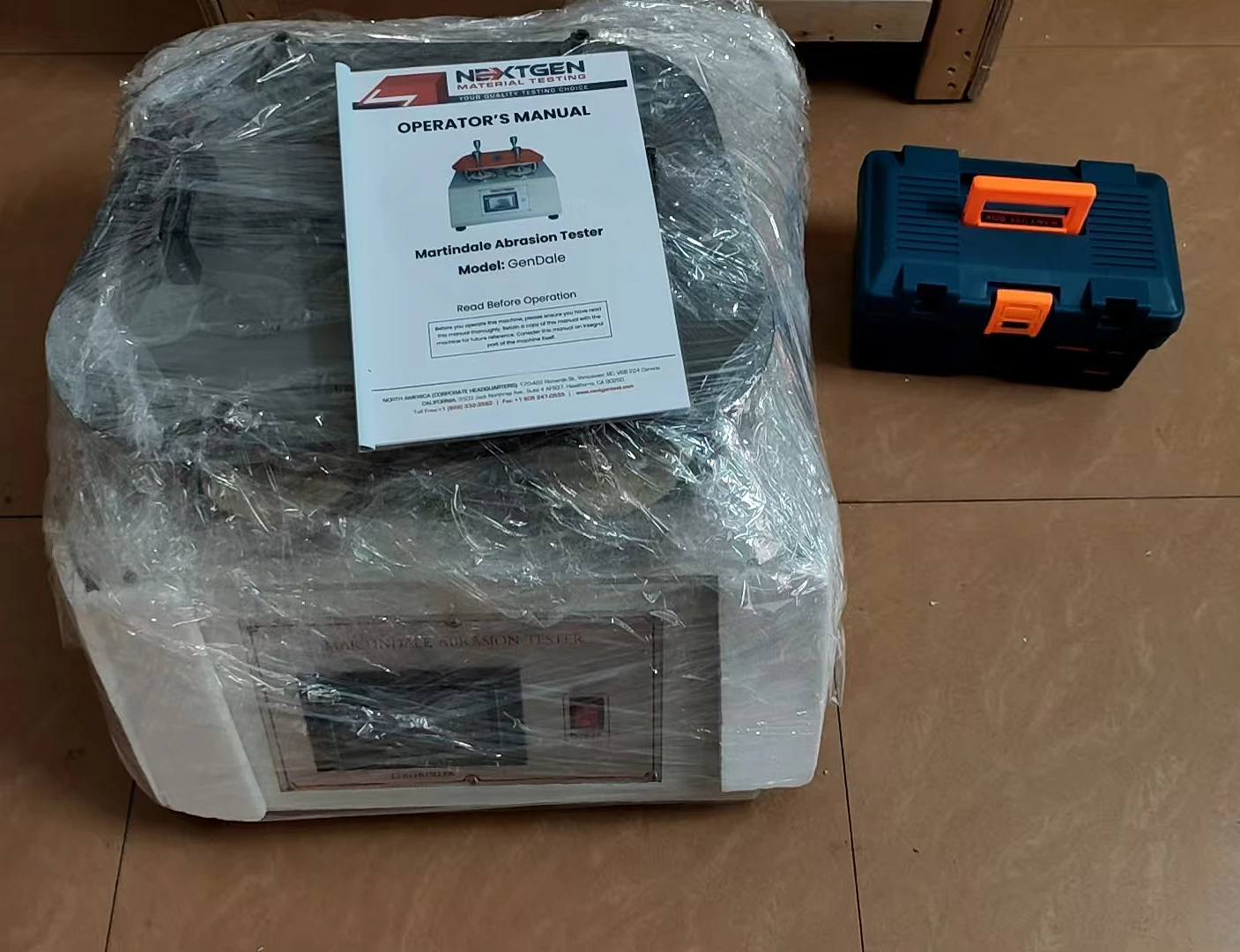Rubber Testing Equipment
Standards
ISO 20344, ASTM 4966/4970, ISO 5470-2, BS EN 388/530, BS 3424/5690, DIN 53863/53865, SATRA TM31, IS 12673, IWSTM 112/196, IWTO 40-88, SFS 4328, NEXT 16, ISO 12945-2, ISO 12947-1, ISO 12947-2, ISO 12947-3, ISO 12947-4






Description
GenDale is a certified Martindale Abrasion Testing system which is mainly used to test shoe fabric, shoe lining, and many other types of shoe related materials. The unit can test up to four specimens at the same time for abrasion. The fabric specimen is measured by having rubbing applied on it via a complex direction of back and forth motion. The accuracy of abrasion strength is determined by the specific number of cycles conducted until a hole appears in the test area of the fabric specimen. This unit is the industry leader for Certified Martindale Abrasion Resistance Testing designed to produce accurate, repeatable and user-friendly testing results every time.
Specifications
| Model # | GenDale |
| Certification | CE ISO SGS |
| Speed | 50-2r / min Adjustable |
| Function | Fabric pilling test and fabric wear resistance test |
| Driver System | PLC Programmable Control with Large Touch-Screen |
| Abrasion Test | |
| Max. stroke of movement: | 60.5+/-0.5mm |
| Weight of holder and spindle: | 200+/-1g |
| Pilling Test | |
| Max stroke of movement: | 24+/-0.5mm |
| Weight of holder and spindle: | 155+/-1g |
| Dimensions (LxWxH) | 34.85"x23.6x16.15" 88.5x60x41 cm |
| Power | AC220 1ph |
Optional Consumables and Spare Parts
| Test Specimen Cutter | (38mm diameter/12cm²) with cutting mat and spare blades. |
| Abradent Fabric & Backing Felt Cutter. | (140mm diameter/154cm2) with cutting mat and spare blades. |
| Standard Wool Abradent Fabric | SM25. 1.6M wide x 5M length – For abrasion test and pilling test(when utomati) |
| Standard Backing Foam. | Width 1.5m, Length 0.5m |
| Standard Backing Wool Felt Piece (woven) | 1m x 1.5m |
| EMPA Photographic Standards for Pilling Test | (3 x 4 knitted) |
| EMPA Photographic Standards for Pilling Test | (3 x 4 woven) |
| SM 50 Photographs for Pilling Test | IWS + ASTM |
| Test Specimen Cutter. | (38mm diameter/12cm²) with cutting mat and spare blades. |

FAQs
The Electric Crocking Tester – GenCrock is designed to evaluate the colorfastness of fabric and leather materials by testing their resistance to dye transfer under both dry and wet conditions. This test method assesses how much dye from the material transfers to another surface when rubbed, indicating how well the color withstands friction or abrasion.
During the test, a specimen is securely fastened to the base of the machine, where it is rubbed with an abrasive hammer equipped with either a dry or wet cloth. The GenCrock then measures the degree of color transfer to the cloth, which is rated to determine dye quality.
This tester is a necessity in industries like textiles and leather manufacturing, where product quality depends on color durability. By simulating everyday wear conditions, GenCrock helps manufacturers guarantee that materials maintain their appearance and color integrity over time.
Click here to learn more about the product or here to receive a personalized quote.
Yes, the GenDale Martindale Abrasion Tester is designed to comply with the IWSTM 112/196 standard, which outlines specific methodologies for testing textile abrasion resistance. This compliance is crucial for ensuring that the abrasion tests conducted with GenDale are both accurate and globally recognized, compliant with established industry norms.
By meeting the IWSTM 112/196 standard requirements, the GenDale Martindale Abrasion Tester provides manufacturers, quality control labs, and research institutions with a reliable tool for assessing textile durability. This standardization ensures that the fabrics tested can withstand expected wear and tear, making this tester an indispensable asset in the textile and footwear industries where material longevity and performance are paramount. The ability to adhere to such rigorous testing standards underscores the tester's utility in evaluating how textiles will perform under actual conditions, thereby assisting in the development of more durable and consumer-friendly products.
Click here to learn more about the product or here to receive a personalized quote.
Yes, the GenDale Martindale Abrasion Tester is designed to meet the requirements of ISO 12947-4, which specifies the method for determining the abrasion resistance of textile fabrics using the Martindale method. This part of the ISO 12947 series focuses on assessing fabric specimen pilling resistance and surface changes under specific testing conditions.
Compliance with ISO 12947-4 guarantees that the GenDale Martindale Abrasion Tester can provide accurate and reliable results when evaluating textile durability and performance. This capability is particularly relevant in industries that demand high standards of fabric quality and longevity, such as fashion, upholstery, and automotive interiors. By adhering to this standard, the GenDale tester helps manufacturers and quality assurance teams ensure that their products can withstand regular use without significant deterioration in appearance or functionality, thereby enhancing product reliability and consumer satisfaction.
Click here to learn more about the product or here to receive a personalized quote.
The GenDale Martindale Abrasion Tester is fully compliant with ISO 12947-3, which specifies the method for determining textile fabrics' abrasion resistance. This standard involves subjecting fabric samples to controlled abrasion using specific abrasive materials until a significant change or breakdown occurs, assessing the fabric's durability and robustness.
ISO 12947-3 differs from ISO 12947-4 in its specific focus. While ISO 12947-3 concentrates on measuring the wear resistance of the fabric (how the fabric withstands abrasion), ISO 12947-4 specifically addresses pilling resistance and other surface changes in the fabric. Pilling resistance evaluates how fabric surfaces endure the formation of small balls of fiber (pills) which can affect the aesthetic and texture of the textile product.
Compliance with both standards assures that the GenDale Martindale Abrasion Tester can provide comprehensive insights into textile durability. This includes both wear resistance and aesthetic durability of fabrics. This dual capability makes the tester highly valuable for textile manufacturers and quality control laboratories focused on ensuring that their products meet both functional durability and visual appeal standards, crucial for consumer satisfaction and market competitiveness.
Click here to learn more about the product or here to receive a personalized quote.
Yes, the GenDale Martindale Abrasion Tester is designed to comply with ISO 12947-2, which specifies the method for determining the abrasion resistance of textile fabrics by the Martindale method. This particular part of the ISO 12947 series outlines the detailed procedure for mounting fabric test specimens and abrasive materials. It also sets the correct pressure and motions for the test.
ISO 12947-2 is essential for verifying that the abrasion testing process is standardized and can be replicated accurately between different testing sessions and laboratories. This standard guarantees that the GenDale Martindale Abrasion Tester not only measures the actual wear resistance of the fabrics but does so under controlled conditions that provide consistent and reliable results. Compliance with this standard is necessary for fabric manufacturers and researchers who need to be certain that their textile products can withstand prolonged use and wear, which is especially important for applications in clothing, upholstery, and other sectors where durability is a key quality parameter.
Click here to learn more about the product or here to receive a personalized quote.
Yes, the GenDale Martindale Abrasion Tester complies with ISO 12947-1, which establishes the general principles and equipment requirements for determining textile abrasion resistance. This part of the ISO 12947 series sets the foundation for the entire testing process. It specifies the type of abrasion tester to be used, the characteristics of the abrasive mediums, and the basic configuration of the test equipment.
ISO 12947-1 is an essential part of the ISO 12947 series since it makes certain that all subsequent parts of the ISO 12947 series, including those that focus on specific testing methods like ISO 12947-2, -3, and -4, are applied correctly and consistently. Compliance with ISO 12947-1 means that the GenDale Martindale Abrasion Tester is equipped and calibrated to perform abrasion tests that meet international standards, providing a reliable basis for assessing textile durability. This compliance is a necessity for manufacturers and testing labs aiming to produce and certify textiles that meet global quality and durability standards so that their products are suitable for a broad range of applications and durable enough to satisfy consumer expectations.
Click here to learn more about the product or here to receive a personalized quote.
Yes, the GenDale Martindale Abrasion Tester is designed to meet ISO 12945-2 requirements. This standard specifies the method for determining pilling and surface changes in textile fabrics using the Martindale method. While ISO 12945-2 is often associated with pilling tests, it also addresses other surface changes that can occur in fabrics under abrasion and stress conditions.
The compliance of the GenDale Martindale Abrasion Tester with ISO 12945-2 guarantees that it can effectively evaluate how textile surfaces withstand repeated friction, which can lead to pilling - a key aspect of textile quality and durability. The standard outlines specific procedures and settings for conducting these tests so that the results are consistent and reproducible across different testing instances and locations.
This capability is particularly important for fabric manufacturers and quality control laboratories that need to ensure their products maintain their appearance and functionality even after extended use. Compliance with ISO 12945-2 helps these entities establish textile durability in terms of resistance to pilling and surface wear, enhancing product reliability and consumer satisfaction.
Click here to learn more about the product or here to receive a personalized quote.
Yes, the GenDale Martindale Abrasion Tester conforms to comply with the NEXT 16 standard. This specific standard outlines methods for assessing the abrasion resistance of textiles, with a particular emphasis on testing protocols that simulate real-world wear conditions. Compliance with NEXT 16 guarantees that the GenDale Martindale Abrasion Tester can accurately measure how textile fabrics endure repeated abrasion, which is essential for applications where fabric durability is a key performance indicator.
Its compliance with the NEXT 16 standard allows the GenDale tester to provide reliable and consistent data necessary for manufacturers and quality assurance teams in the textile industry. This standard is particularly valued for its rigorous approach to testing, which helps in predicting the lifespan and maintaining the quality of textiles under typical usage conditions. For industries such as clothing and home furnishings, where fabric wear and durability are directly linked to customer satisfaction and product reputation, compliance with such standards is essential.
Click here to learn more about the product or here to receive a personalized quote.
Yes, the GenDale Martindale Abrasion Tester meets SFS 4328. This standard specifies testing methods for determining the abrasion resistance of fabrics, making sure that the equipment is suitable for evaluating the durability and wear performance of textile materials. Compliance with SFS 4328 guarantees that the GenDale Martindale Abrasion Tester can accurately simulate wear effects on fabrics, providing essential data for manufacturers to assess product longevity and quality.
With its compliance with the SFS 4328 standard, the GenDale Martindale Abrasion Tester aligns with specific testing protocols critical for the textile industry, especially in regions or markets where this standard is recognized. As a result of this compliance, manufacturers are able to verify that their textile products meet or exceed the performance criteria expected, which is vital in maintaining a competitive edge and making sure that consumers can trust the quality and durability of their products.
Click here to learn more about the product or here to receive a personalized quote.
Yes, the GenDale Martindale Abrasion Tester is designed to comply with IS 12673. This standard, established by the Bureau of Indian Standards (BIS), outlines methods for determining textile fabrics' abrasion resistance. Compliance with IS 12673 ensures that the GenDale Martindale Abrasion Tester can accurately assess fabrics' wear and tear resistance under specific test conditions prescribed by the standard.
This compliance is vital for manufacturers and quality control laboratories within India, or for those exporting to Indian markets, so that the textiles meet local regulatory requirements and consumer expectations for durability. By adhering to IS 12673, the GenDale Martindale Abrasion Tester provides reliable data that optimizes fabric performance and quality, key to sustaining competitiveness in the textile industry. This standard's adherence also helps consumers trust textiles, offering assurance that they have been rigorously tested and meet established durability standards.
Click here to learn more about the product or here to receive a personalized quote.
Yes, the GenDale Martindale Abrasion Tester is designed to meet IWTO 40-88 specifications. This standard, issued by the International Wool Textile Organization, outlines the methods for determining the abrasion resistance of wool textiles. It provides assurance that GenDale tests are appropriate and relevant for wool fabrics. Compliance with IWTO 40-88 is particularly important for the wool industry, as it provides a consistent and internationally recognized benchmark for evaluating woolen products' durability and wear resistance.
Meeting the IWTO 40-88 means that the GenDale Martindale Abrasion Tester can deliver accurate and reliable results, essential for manufacturers who need to verify that their wool textiles can withstand daily use without significant deterioration. This capability allows for maintaining quality standards in wool textiles, supporting the development of products that meet consumer expectations for comfort and longevity, and enhancing the overall value of woolen garments and furnishings on the market.
Click here to learn more about the product or here to receive a personalized quote.
Yes, the GenDale Martindale Abrasion Tester is designed to comply with SATRA TM31, a standard set by SATRA Technology Centre, which is renowned for its rigorous testing methodologies for footwear materials, including those used in shoe construction and other types of footwear. SATRA TM31 specifies methods for assessing the abrasion resistance of materials used in the sole and upper parts of footwear, making sure that they can withstand regular wear and tear.
Compliance with SATRA TM31 is vital for manufacturers in the footwear industry, as it provides a benchmark for the durability and quality of materials that directly impact the longevity and performance of the final product. By meeting SATRA TM31 requirements, the GenDale Martindale Abrasion Tester helps verify that footwear manufacturers can produce durable, reliable, and meet consumers' expectations in terms of wear resistance. This compliance also supports manufacturers in maintaining industry standards and improving product quality in competitive markets.
Click here to learn more about the product or here to receive a personalized quote.
Yes, the GenDale Martindale Abrasion Tester meets DIN 53863 and DIN 53865. These German standards specify the methods for testing textile abrasion resistance, with DIN 53863 focusing on general testing procedures and DIN 53865 detailing more specific conditions for testing textiles used in different applications. Compliance with these standards guarantees that the GenDale Martindale Abrasion Tester can accurately evaluate how textiles withstand mechanical wear and tear under controlled conditions, which simulate real-world usage.
In conformance with DIN 53863 and DIN 53865, the GenDale Martindale Abrasion Tester offers reliable and standardized assessments for textile durability, a valuable tool for manufacturers and researchers who need to ensure their products meet high-quality standards and are fit for purpose. This compliance is particularly important for those in the European market or for global companies needing to meet international durability standards in textiles, facilitating the development and certification of durable textiles that meet consumer expectations.
Click here to learn more about the product or here to receive a personalized quote.
Yes, the GenDale Martindale Abrasion Tester is designed to meet BS 3424 and BS 5690 standards. These British Standards outline the methods for determining textile fabrics' abrasion resistance. BS 3424 covers a comprehensive range of textile tests, including abrasion, while BS 5690 provides specific requirements for coated fabrics testing. Compliance with these standards guarantees that the GenDale Martindale Abrasion Tester can effectively evaluate the wear and durability of both uncoated and coated textile materials.
Based on BS 3424 and BS 5690, the GenDale Martindale Abrasion Tester provides manufacturers, quality assurance teams, and researchers with a reliable means of assessing how textiles will perform under typical use conditions. This is essential in industries where textile products' durability is critical, such as apparel, upholstery, and technical textiles. Meeting these standards allows the GenDale Martindale Abrasion Tester to support the development of textiles that meet rigorous durability criteria, essential for maintaining consumer trust and satisfaction in the textile market.
Click here to learn more about the product or here to receive a personalized quote.
Yes, the GenDale Martindale Abrasion Tester is designed to meet BS EN 388 and BS EN 530. BS EN 388 specifies methods for testing protective gloves' abrasion resistance, whereas BS EN 530 outlines abrasion resistance tests for protective clothing materials. Compliance with these standards ensures that the GenDale Martindale Abrasion Tester accurately evaluates the durability and performance of safety apparel materials.
Following BS EN 388, the tester can assess how well gloves can withstand physical wear during use, which is crucial for ensuring user safety in environments that require hand protection. Similarly, compliance with BS EN 530 allows the tester to determine the durability of fabrics used in protective clothing under abrasive conditions. This dual capability is essential for manufacturers and quality control laboratories that focus on the development and certification of protective apparel, guaranteeing that their products provide effective and reliable protection in accordance with European safety standards.
Click here to learn more about the product or here to receive a personalized quote.
Yes, the GenDale Martindale Abrasion Tester meets ISO 5470-2. This standard specifies the method for determining the abrasion resistance of rubber-coated fabrics using the rotary platform, double-head (RPDH) test. The GenDale Martindale Abrasion Tester's compliance with ISO 5470-2 guarantees that it can accurately assess the wear performance of rubber-coated materials, which is important for applications such as automotive components, protective clothing, and industrial equipment.
Based on ISO 5470-2, the GenDale Martindale Abrasion Tester provides reliable data that help manufacturers understand the durability and potential lifespan of rubber-coated fabrics under mechanical stress. This standard is necessary for making sure that products meet rigorous quality and durability requirements before being introduced to the market. The tester's capability to perform according to this standard underscores its utility in helping manufacturers develop durable products that meet international quality standards.
Click here to learn more about the product or here to receive a personalized quote.
Yes, the GenDale Martindale Abrasion Tester complies with ASTM 4966 and ASTM 4970. These standards provide the basis for testing textile fabrics' abrasion resistance, with ASTM 4966 focusing on the Martindale method for determining abrasion resistance, and ASTM 4970 addressing textile pilling characteristics. Compliance with these ASTM standards ensures that the GenDale Martindale Abrasion Tester can provide accurate and reliable results for assessing textile durability and surface wear.
ASTM 4966 is of particular importance for industries that require rigorous evaluation of fabric wear under simulated real-life conditions, such as apparel, upholstery, and automotive interiors. Meanwhile, ASTM 4970 provides essential guidelines for evaluating fabric pilling, a key factor in maintaining textile products' aesthetic quality. By meeting both standards, the GenDale Martindale Abrasion Tester aids manufacturers and quality control labs in verifying their textile products are capable of withstanding wear and maintaining appearance, improving consumer satisfaction and product longevity.
Click here to learn more about the product or here to receive a personalized quote.
Yes, the GenDale Martindale Abrasion Tester complies with ISO 20344, which outlines the methods for testing personal protective equipment and footwear, including specific tests for determining the abrasion resistance of materials used in the upper, lining, and outer sole components of footwear. This standard is vital for ensuring that footwear products offer adequate durability and protection, as required in various occupational environments.
Compliance with ISO 20344 enables the GenDale Martindale Abrasion Tester to accurately evaluate how well footwear materials can withstand daily wear, particularly in demanding work settings. This capability is essential for footwear manufacturers who need to ensure their products meet safety standards and provide sufficient durability. ISO 20344 not only helps in developing safe and reliable products but also supports manufacturers in maintaining compliance with regulatory requirements and consumer expectations for high-quality, durable footwear.
Click here to learn more about the product or here to receive a personalized quote.
The certified GenDale Martindale Abrasion Testing system is primarily used for evaluating the abrasion resistance of shoe fabrics, shoe linings, and other shoe-related materials. This specialized equipment is designed to simulate the wear and tear materials endure in footwear through repeated contact with abrasive surfaces. By testing how these materials withstand abrasion, the GenDale system helps footwear manufacturers and designers guarantee that their products are durable and capable of maintaining both functionality and appearance under normal use conditions.
This testing system is critical for the footwear industry as it directly impacts product quality and consumer satisfaction. The ability to accurately assess material durability enables manufacturers to make informed decisions about material selection and product design, ultimately leading to shoes that offer increased longevity and better performance. The GenDale system certification assures users of its compliance with industry standards, making it a trusted tool in footwear development and quality assurance.
Click here to learn more about the product or here to receive a personalized quote.
The GenDale Martindale Abrasion Tester can test up to four specimens together for abrasion. This capability allows for efficient and time-saving testing, enabling manufacturers and testing laboratories to conduct multiple assessments in parallel. This feature is particularly beneficial in high-throughput environments where large volumes of fabric need to be tested quickly to keep pace with production schedules and quality assurance processes.
In addition to enhancing productivity by testing multiple samples at the same time, the GenDale Martindale Abrasion Tester is also able to provide comparative insights between different materials or treatments under the same test conditions, as it tests multiple samples at once. Using simultaneous tests provides consistency in abrasion resistance evaluation, making it easier to determine the durability and suitability of materials used in shoe manufacturing and other textile applications.
Click here to learn more about the product or here to receive a personalized quote.
The GenDale Martindale Abrasion Tester measures fabric specimen durability by applying a specific rubbing action through a complex back-and-forth motion. This method simulates the natural wear process fabrics undergo during use. The tester uses abrasive materials that contact the fabric in a controlled, repetitive manner, simulating the normal wear and tear that occurs in everyday life.
This testing method is essential for accurately determining how well textiles maintain their integrity and appearance under stress. By replicating the multidirectional stress fabrics face in real-world conditions, the GenDale Martindale Abrasion Tester provides valuable data on fabric abrasion resistance. This information helps manufacturers understand the potential longevity and performance of their materials, enabling them to make informed decisions about product development and quality control. The precise simulation of wear patterns allows for the optimization of fabric treatments and product durability, key factors in competitive textile markets.
Click here to learn more about the product or here to receive a personalized quote.
When a dispute arises from a material supplier, the customer and supplier should perform comparative tests to determine if there is a statistical bias between the tests. Each side should take a group of test specimens that are as homogenous as possible from the material in question. The fabric specimens should be assigned at random in equal numbers for each laboratory to test. The average results from both testing’s should be compared. If a bias is found after comparing results, the cause must be investigated and corrected or the purchaser and supplier need to consider the bias when interpreting the test results of the material in question.
Woven, Non-woven and knit apparel fabrics are most common types to be tested with the Martindale abrader. Other common fabrics include household fabrics such as curtains, pillows, or sofa materials and commercial/industrial heavy duty fabrics.
When considering the sample breakage testing method, the Martindale system usually provides a score of 1000's cycles of abrasion completed. The general idea of the scoring system is as follows:
- 1000 Cycles or Less - Decorative Fabric - not recommended for general use
- 10,000-15,000 Cycles - Light Use - Delicate Yarns - Light Furniture Use
- 25,000-30,000 Cycles - Heavy Use - Every Day Furniture
- 30,000+ Cycles - Commercial Use - High Durability and Resistance to Abrasion
The testing process should be stopped immediately once a change in the appearance of the fabric specimen is noticed - or when two yarns break. Due to the involvement of the technician for ending the test, the Martindale system can have skewed results caused by human error.
The material being tested is loaded onto the lower plates of the Martindale abrasion tester. The abrading material which consists of a small disk of worsted wool or wire mesh is loaded on top of the test specimen. The abrading material has constant contact with the specimen fabric and is oscillating in a circular motion.
The Martindale system tests the abrasion resistance of the fabric while in constant friction with another material. It also has the capabilities of measuring the pilling resistance which directly affects the fabrics durability and application of the material.
Unfortunately, the Martindale Abrasion method is not satisfactory or widely accepted as a method for approving shipments of fabric. The Martindale has issues in consistency and results can vary between operators. With this being a large downside of the Martindale system, the test method is still widely used outside of the United States and is in accordance to many ISO standards, ASTM D4966 as well as many EU and GB standards (ISO 20344, ISO 12947, ISO 17704, ASTM D4966-12e1 to name a few).
Related Products
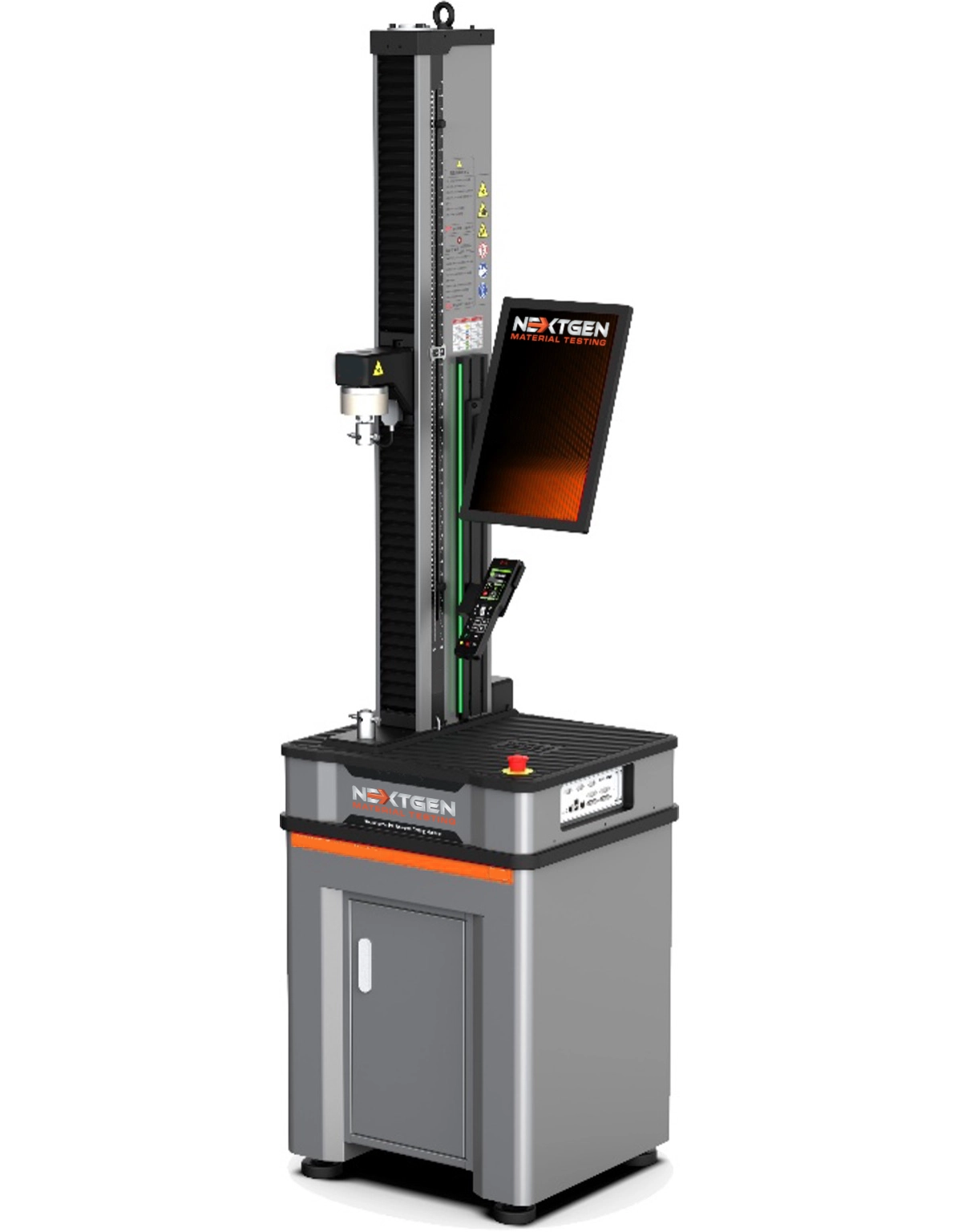
NG-EML Series A – Single Column Bench Top Universal Testing Machine (50 N – 5 kN)
The NG-EML Series A – Single Column Bench Top UTM (50 N–5 kN) is a precision electromechanical system designed for tension, compression, and flexural testing of low-force specimens. Featuring GenTest™ software, a high-speed servo drive, Class 0.5 accuracy, and USB/Ethernet control, this compact tabletop unit supports ASTM, ISO, and EN standards. Ideal for testing plastics, rubber, foams, films, composites, and thin metals.
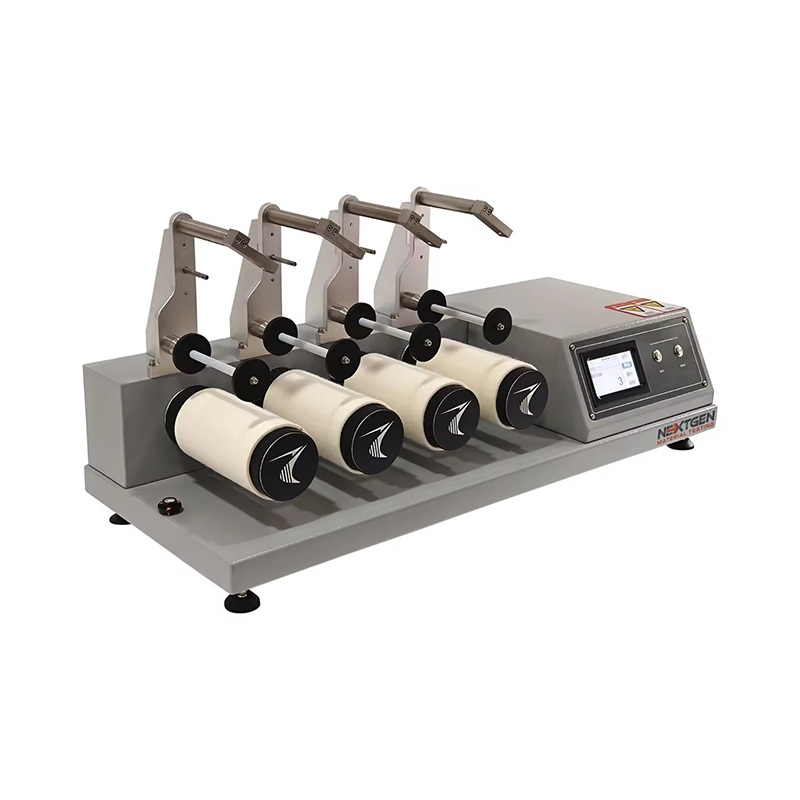
ICI / Mace Snag Tester
Discover the Fabric Textile ICI / Mace Snag Tester, a reliable tool for assessing fabric snagging under normal wear conditions.

Moving Die Rheometer (MDR)
Introducing the NG-MDR Moving Die Rheometer, your solution for accurately assessing the curing and processing characteristics of vulcanized rubber compounds. Designed for precision, this state-of-the-art rheometer captures the characteristic curve and parameters of rubber vulcanization by measuring the torque applied to the oscillating die.
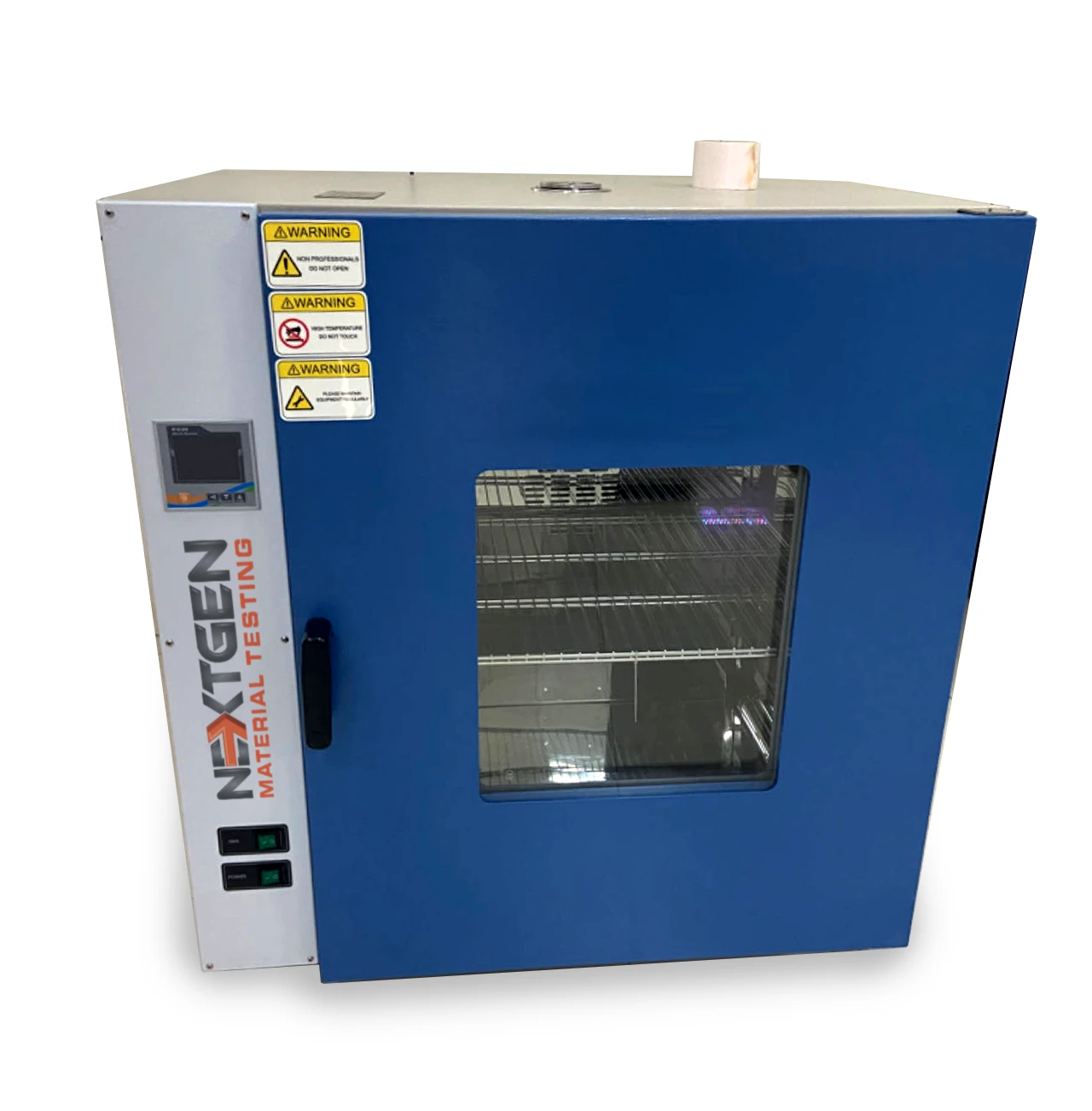
Aging Oven – High-Temperature Chamber – NG-AGOV-ADV
The NG-AGOV-ADV Aging Oven is designed for high-temperature testing of rubber, plastics, and insulating materials. It features programmable PID control, uniform airflow, and forced convection for stable and repeatable aging cycles. This system supports global testing standards including ISO 188, ASTM D573, and IEC 60216-4-1. With its durable stainless-steel chamber and user-friendly interface, it’s ideal for R&D, quality control, and certification labs.
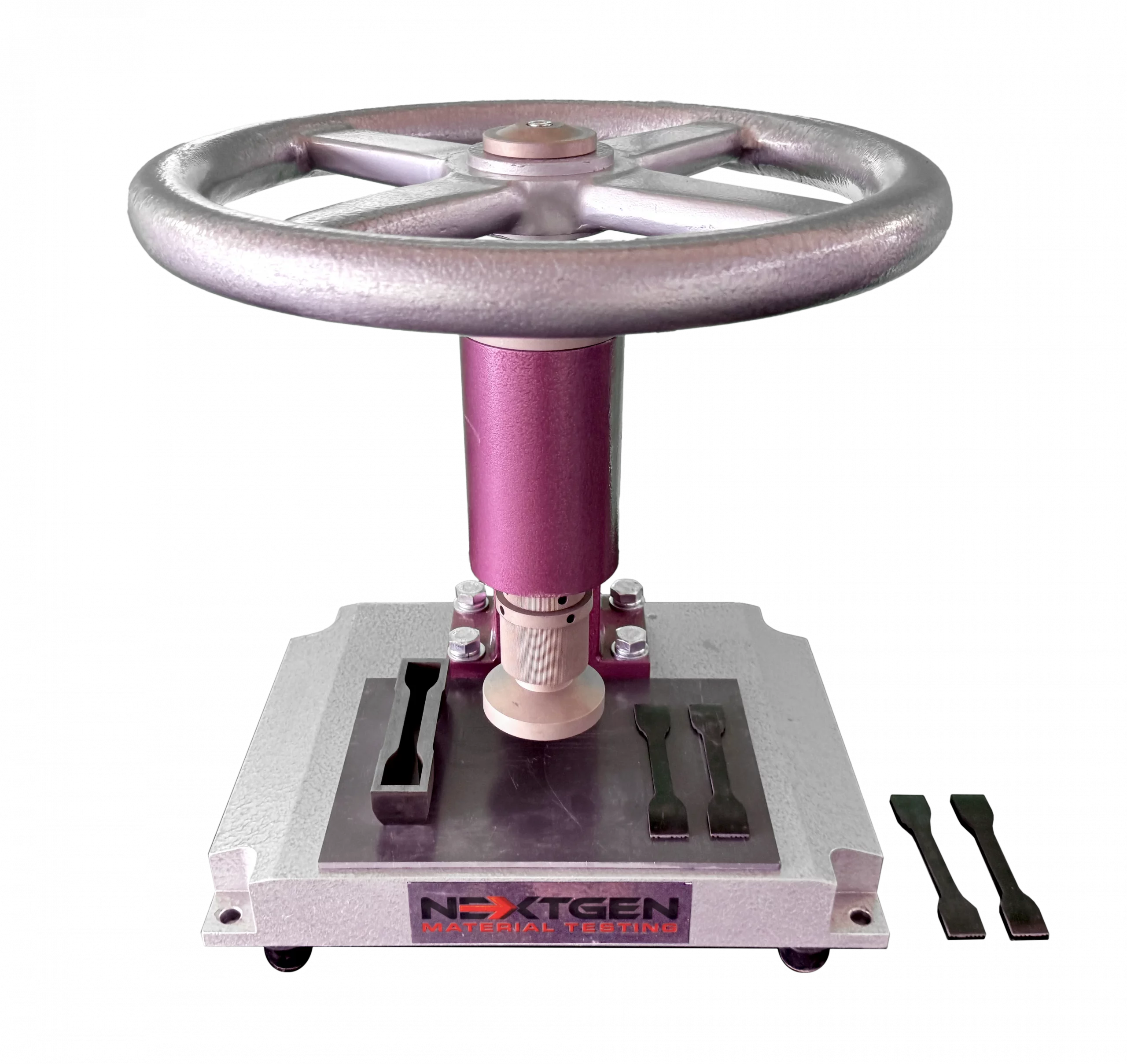
NG-T-Press M Series - Manual Cutting Press System for Rubber Tensile Specimens
Our newest manual cutting press system is suitable for laboratories to create specimens from rubber, tape, and special materials.
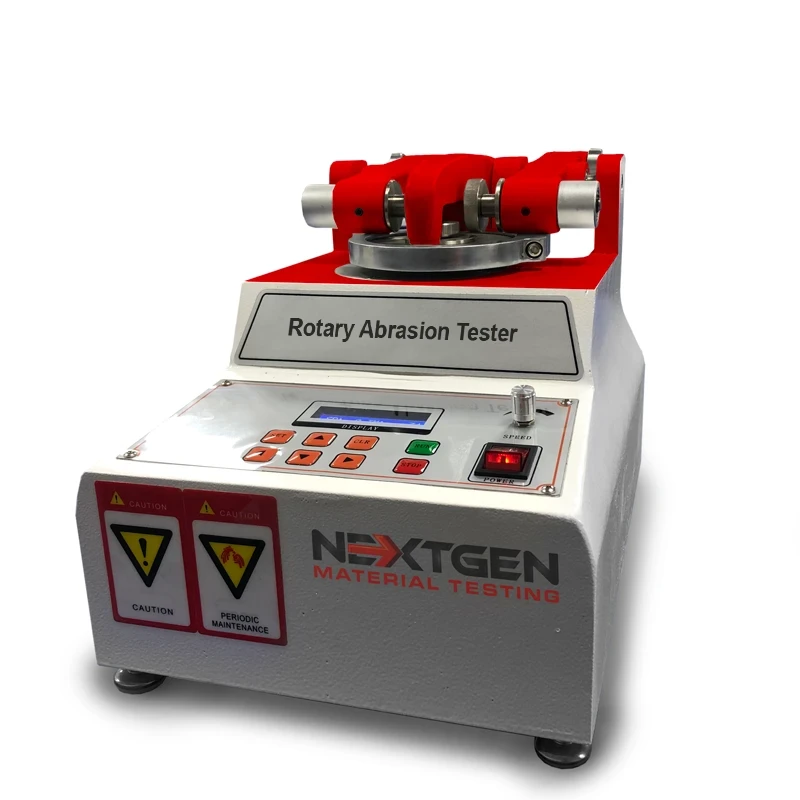
Rotary Abrasion Tester Single & Dual Wheel
GenRotary used evaluate abrasion resistance. It can conduct tests on a wide range of materials such as: cloth, paper, paint, plywood, leather, tile, glass, rubber etc. It tests the specimen by rotating it while in contact with the grinding wheel and applying the required pressure. The Joss of weight reflects on the change in weight of the specimen. The unit also has an intelligent power failure recovery function.
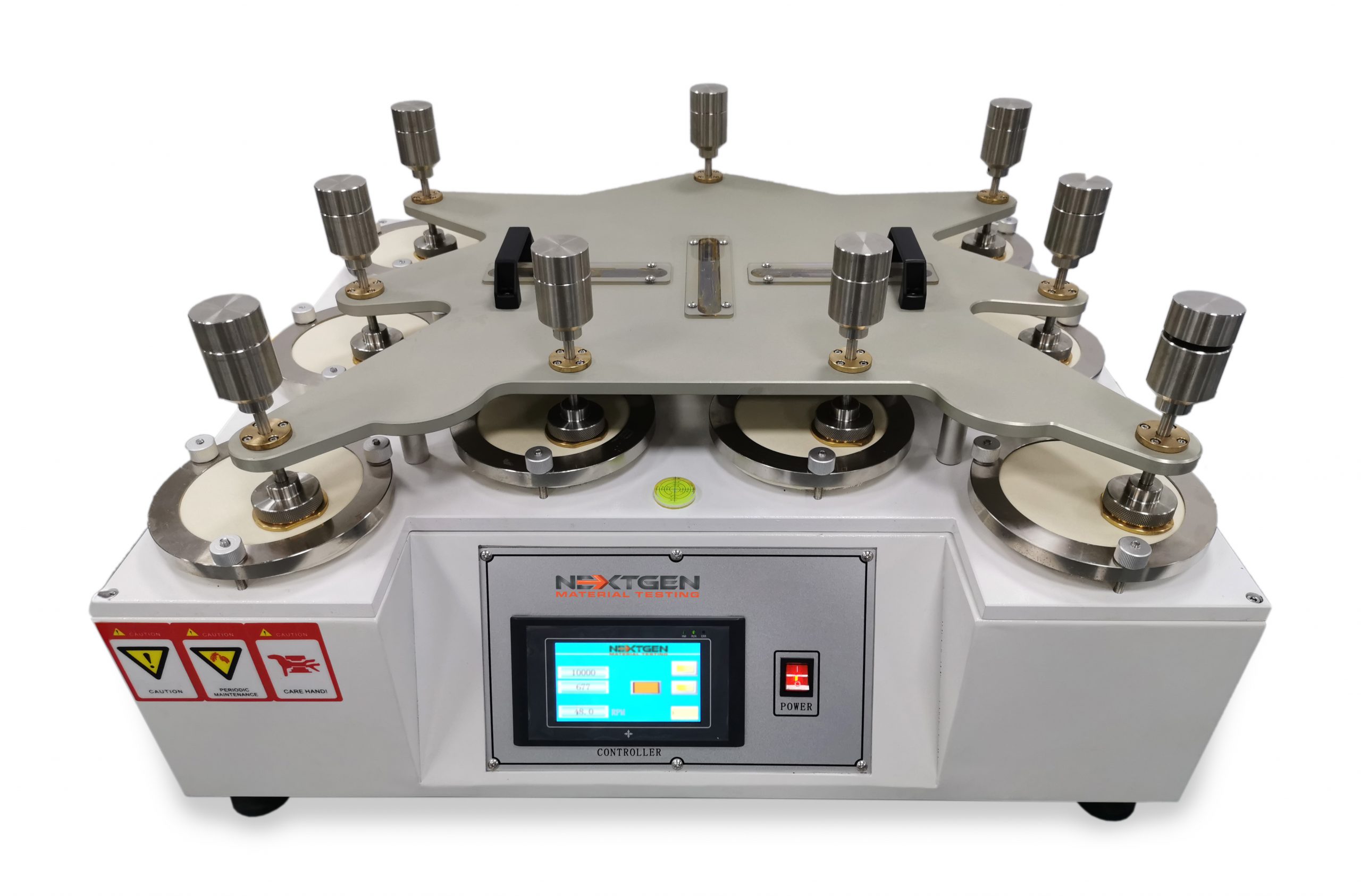
9-Station Martindale Abrasion Tester
The GenDale - Martindale Abrasion Tester is mainly used to test shoe fabric, shoe lining, and many other types of shoe related materials.
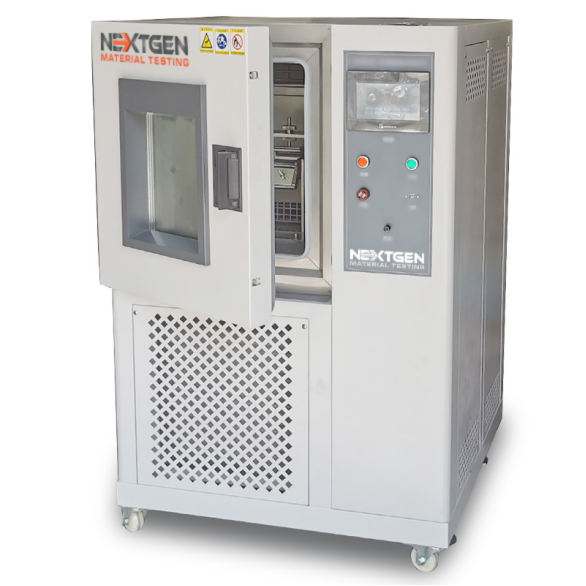
GenRoss-CH - Ross Flex Tester with Low Temperature Chamber
GenRoss-CH is an advanced Ross Flex Tester designed for assessing the cold resistance of materials in low temperature environments.

Linear Abrasion Tester
NextGen's linear abrasion meters evaluate the abrasion and scratch resistance of products, along with color transmission.
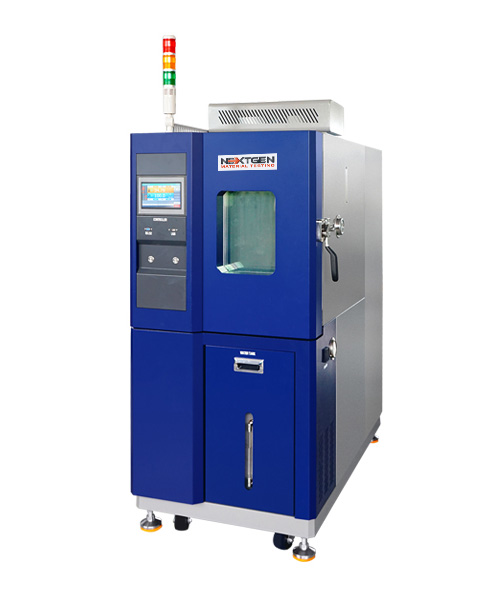
NextGen Environmental Chambers NG-EC 100,150,225,408,1000
The temperature and humidity NextGen Environmental Chambers features a sturdy cabinet made of cold-rolled steel and stainless steel.
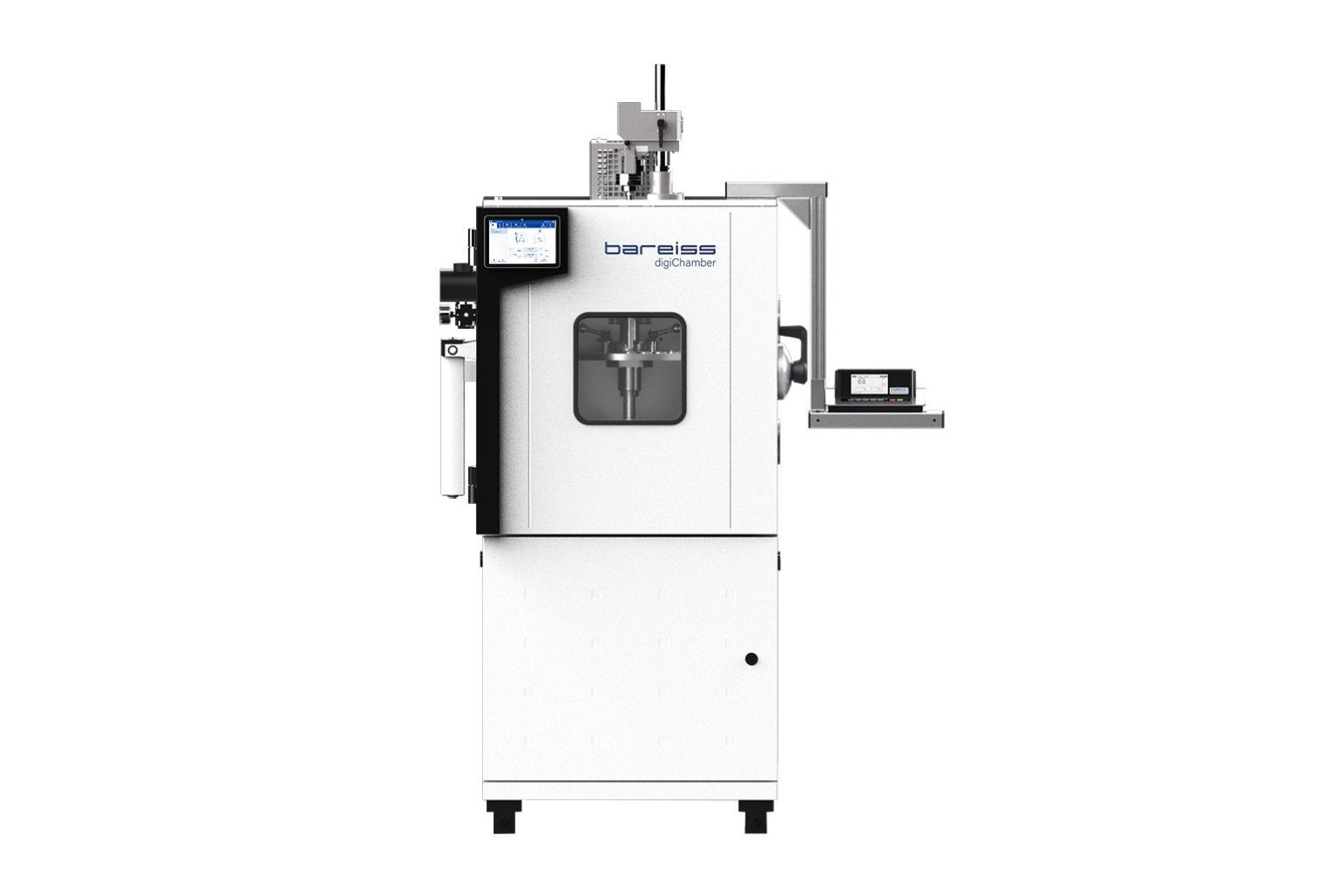
digiChamber - Temperature Controlled Hardness Testing
Discover digiChamber from NextGen Material Testing, the advanced temperature-controlled hardness tester developed by Bareiss.
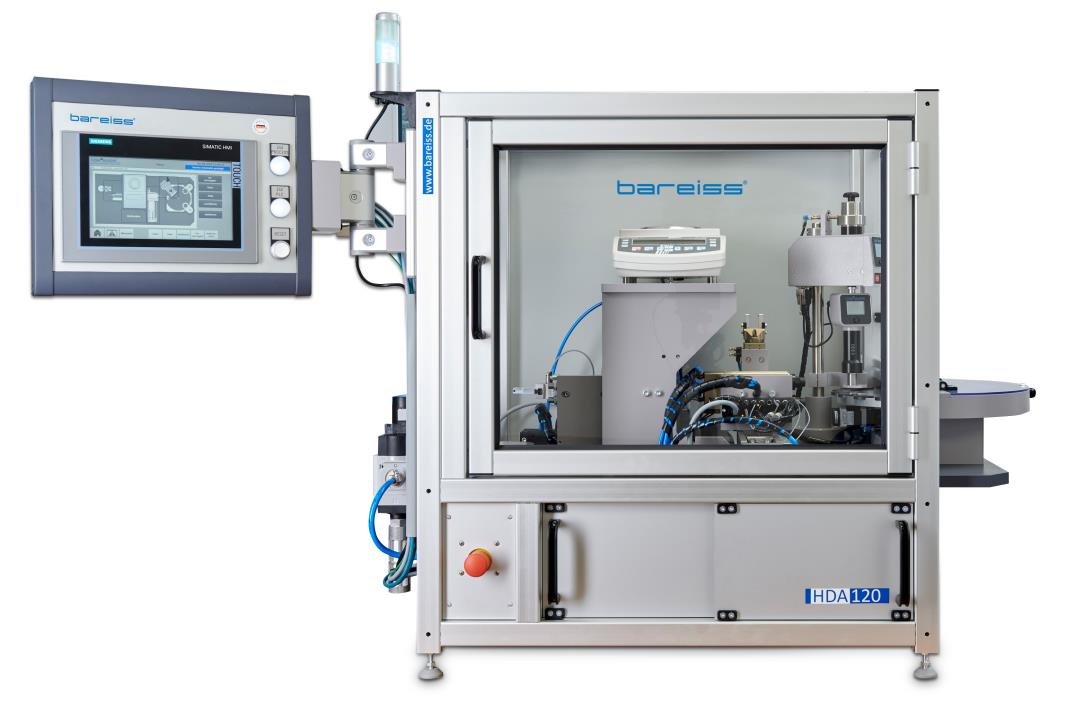
HDA 120 - Hardness and Density Automation Test System
The HDA 120 test system is a versatile solution for semi-automatic detection of sample hardness and density.
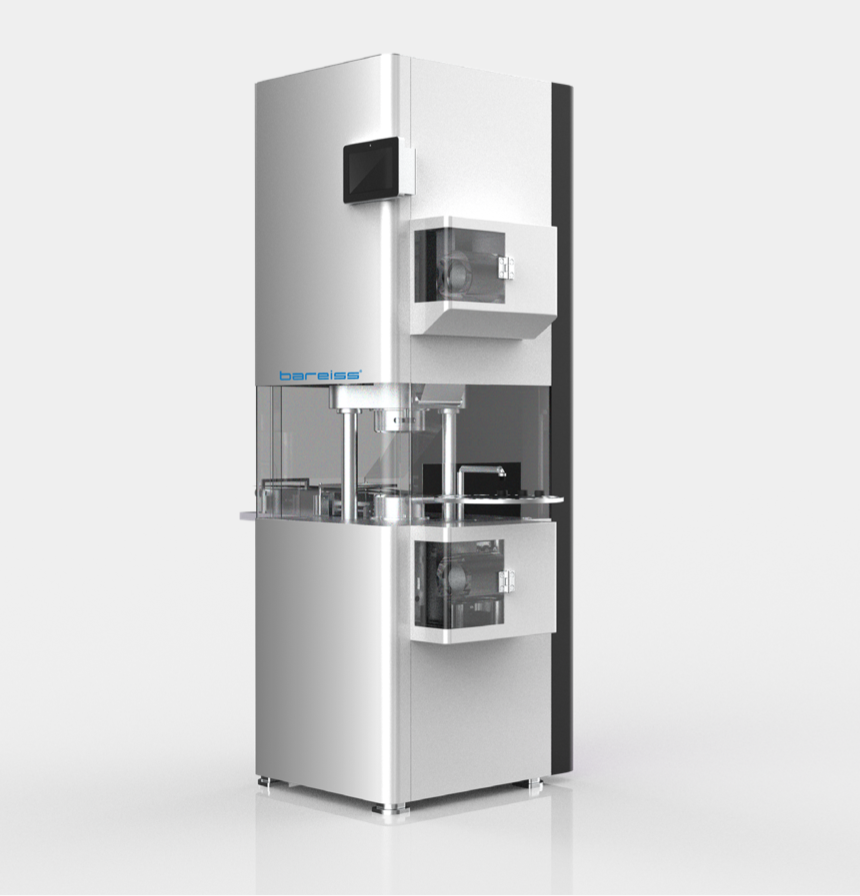
RPA Ultra - Advanced Rubber Process Analyzer Rheometer
RPA Ultra is an advanced rubber process analyzer rheometer that measures the dynamic and static characteristics of raw rubber compounds
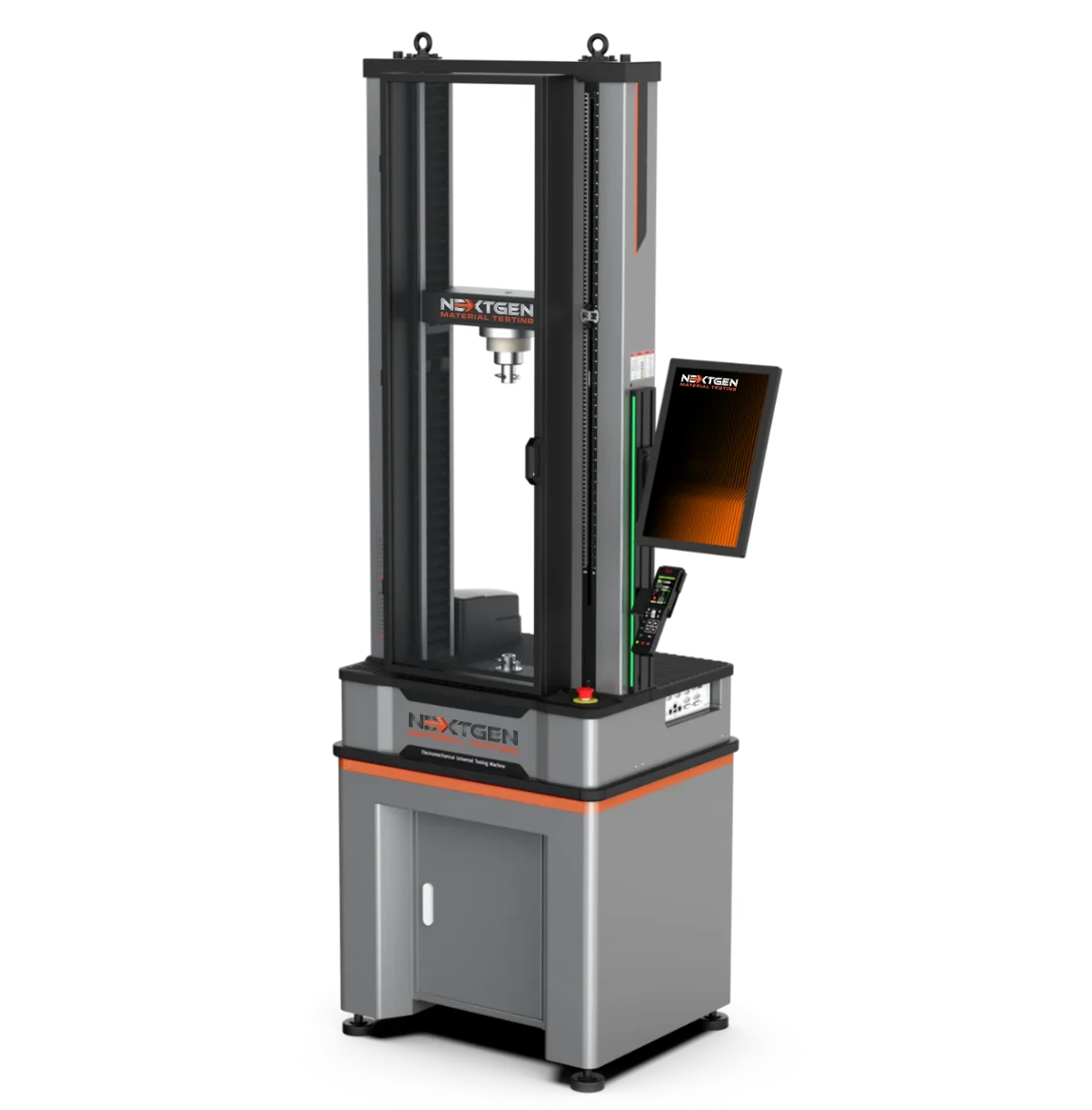
NG-EML Series B – Dual Column Bench Top Universal Testing Machine (100 N – 10 kN)
The NG-EML Series B is a high-precision dual-column benchtop universal testing machine engineered for tensile, compression, and flexural testing in the 0.1 kN to 10 kN range. It features Class 0.5 accuracy, a rigid FEM-optimized frame, and a direct-drive servo system with advanced closed-loop control, making it ideal for testing rubber, plastics, metals, composites, and high-performance polymers in both R&D and quality assurance settings.
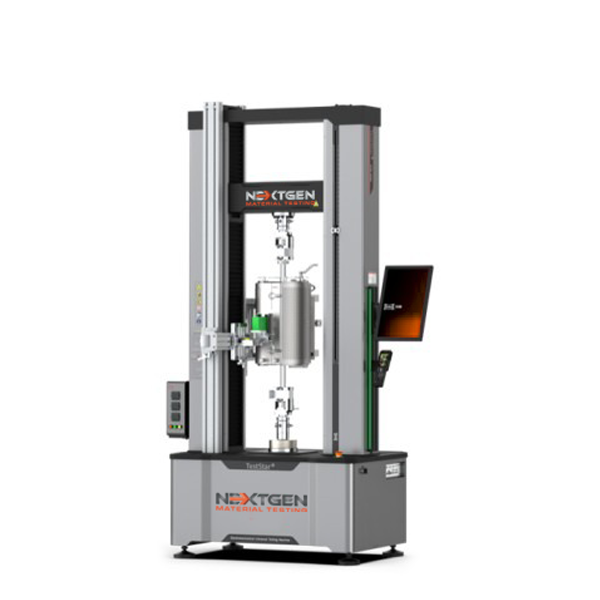
NG-EML Series C – Dual Column Bench Top and Floor Standing Universal Testing Machine (5 kN – 50 kN)
The NG-EML Series C is a precision-engineered dual-column universal testing machine for tension, compression, and flexural testing of metals, composites, rubbers, and polymers. Available in both bench-top and floor-standing formats, with force capacities from 5 kN to 50 kN and Class 0.5 accuracy.
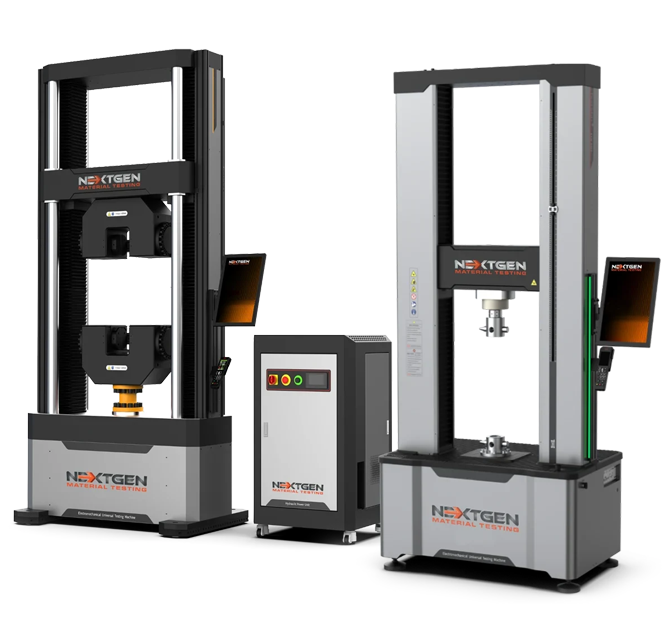
NG-EML Series D – Floor Standing Universal Testing Machine (50 kN – 1000 kN)
The NG-EML Series D – Floor Standing Universal Testing Machine (50 kN–1000 kN) is a dual-column system for tensile, compression, flexural, shear, and cyclic testing of high-strength metals, composites, polymers, and advanced materials. Available in single-space and dual-space configurations, it meets ASTM E8, ISO 6892-1, ISO 527, and GB/T 228 standards. With closed-loop control, 1200 Hz sampling, ultra-low speeds (0.00005 mm/min), and waveform generation, it is ideal for aerospace, automotive, construction, and research labs.
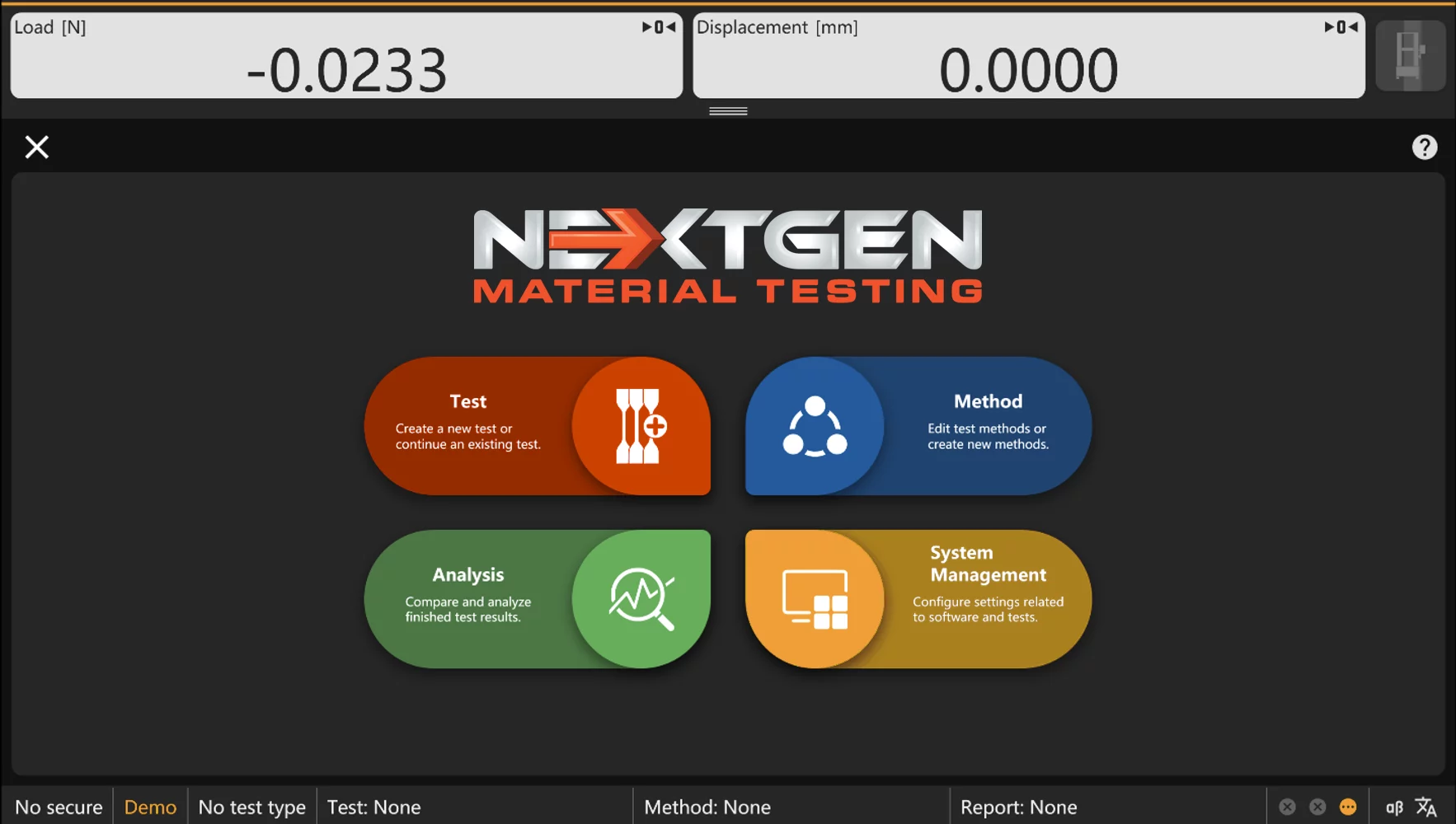
GenTest – Advanced UTM Testing Software
GenTest Software provides test control and data acquisition for universal testing machine workflows used in quality control and materials testing. It combines method templates, step-based sequencing, live curve monitoring, and built-in calculations in one environment. The software supports standards-based testing programs aligned with ASTM, ISO, DIN, EN, and BS. Results and reports remain linked to the method and specimen inputs for consistent review, auditing, and customer documentation.
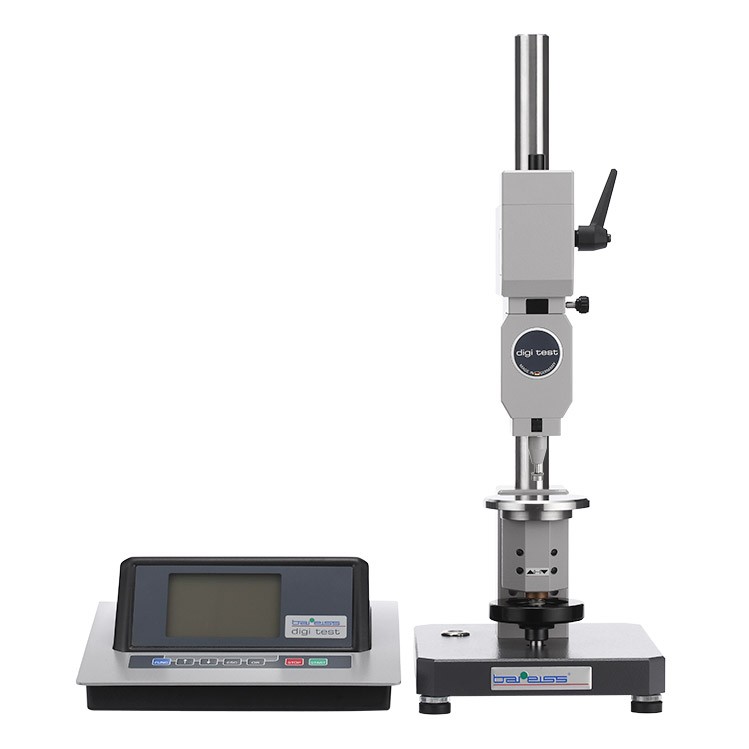
Automatic Shore, IRHD and VLRH Hardness Testing System
NextGen is proud to present our German line of fully-automatic Shore, IRHD and VLRH hardness testing system for plastic materials, plastic and foam compounds for the ultimate precision, accuracy and repeatability, exceptional ease-of-use and maintenance. Experience the industry leader for specimen testing including rubbers, plastics, foams, composites, o-rings, and more.
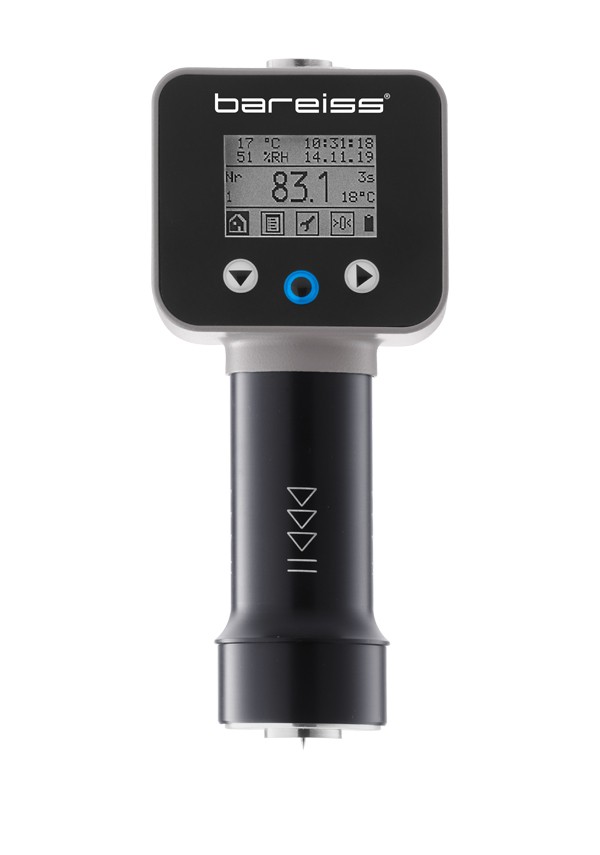
Advanced Portable Shore Durometer System with Test Stand Options
HPEIII is NextGen's advanced German line of equipment that is the new generation of HPE systems ideal for various plastic and plastic compound testing. The new system enhancements offer advantages including temperature sensor, reading values of ambient temperature and humidity, historical hardness value display, larger LCD display, standard USB connection and much more. These advanced portable systems can be paired up with either manual or automatic motorized test stands to help eliminate the human error factor and maximize accuracy and repeatability between test when switching from one operator to the next.
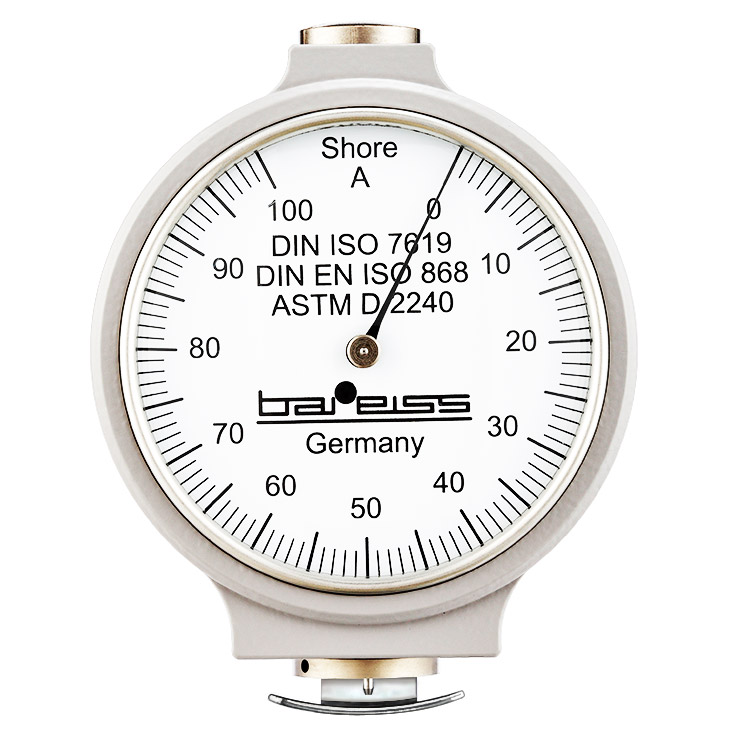
Classic Analogue Shore Durometer with Test Stand Options
This German-manufactured system has been the global benchmark of Shore hardness testing systems since 1954. With ever enhanced ergonomic design, the HP Shore Hardness Tester is both visually appealing and precise rubber and plastic testing system as it has been for nearly 50 years.
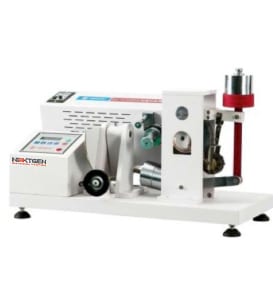
Akron Abrasion Tester
GenKron is used together with a special balance for testing the abrasive consumption of materials. The measurements are done through volumetric loss of a rotating specimen exposed to the action of a standard grinding wheel. It is especially suited for testing harder materials such as shoe soles, tires and other rubber materials.
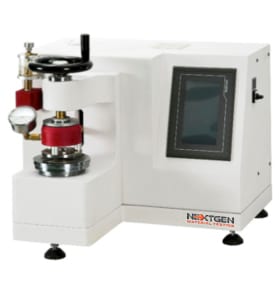
Burst Strength Tester for Fabric
GenBurst is the Burst Strength Tester designed to test anti-rupture strength of variety of materials such as leather, paper and fabric.
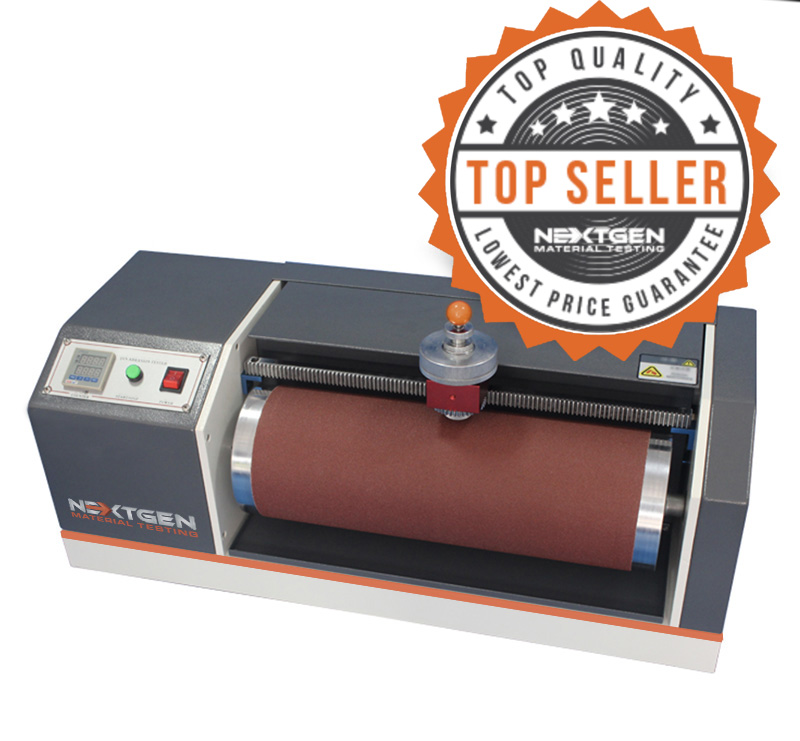
DIN Abrasion Tester
GenDin, is designed to conform to the ASTM D5963 and IS0 4649 standards. This top quality and highly popular abrasion tester will allow you to measure the abrasion resistance of rubbers (vulcanized thermo set rubbers and thermoplastic elastomers) that are subject to abrasive/frictional wear on their actual service. Since wear is always a result of abrasion, different test methods have been developed for the simulation of long term wear.
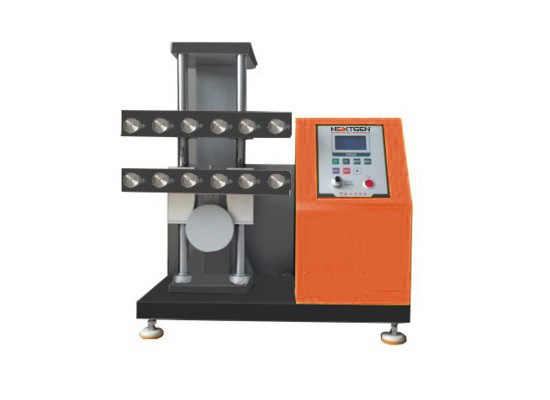
Demattia Flex Cracking Tester
GenFlex tests the ability of rubber products to withstand repeated flexing without developing cracks is of prime importance where such products are used in conditions undergoing repeated flexing. Flexing endurance of rubber products is determined by simulating in laboratory the action of flexing repeatedly under standard conditions of speed, mode, and degree of flexing.
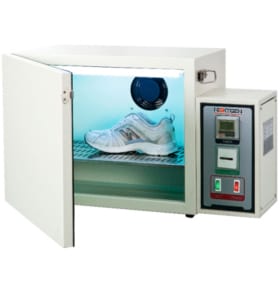
Discoloration Meter
The machine is used to simulate an environment of sunlight radiation on a specimen to identify the resistance of fabric to discoloration.
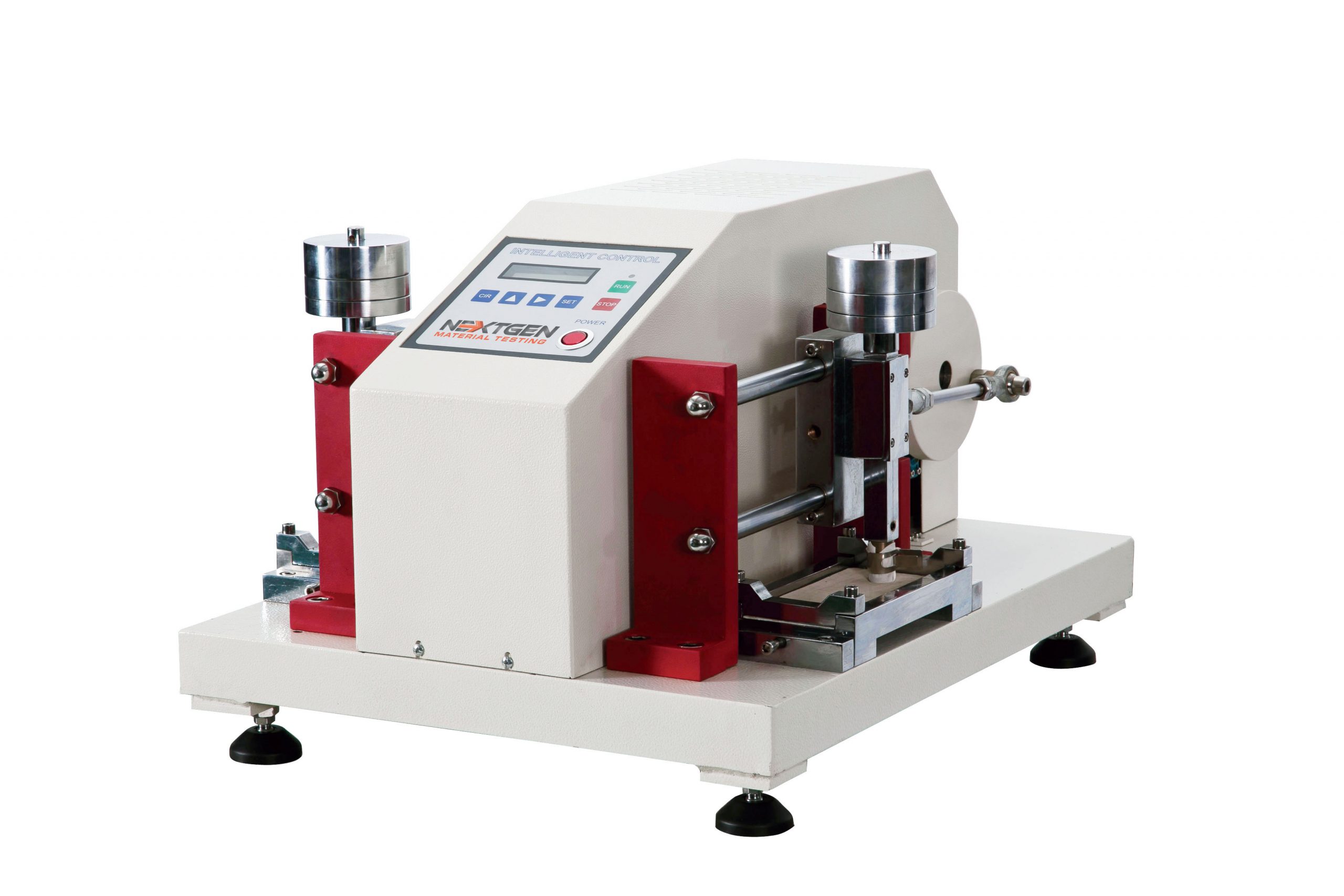
Electric Crocking Tester - GenCrock
The machine is used to test the dyeing of the fabric, and the fade degree of the leather after dry or wet rubbing. The test method involves the specimen to be fastened to the base of the crocking meter and rubbed with an abrasive hammer attached to a wet or a dry cloth under controlled conditions. The transfer of colour is then measured using a scale to evaluate the rating of the specimen's dyeing grade.
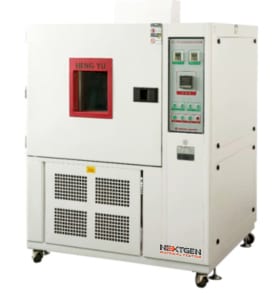
Freezing Tester - GenFreeze
GenFreeze is specially designed to test the characteristics of various materials in a cold environment to ensure suitability for use in a cold climate. Based on the testing demand, adjust the beater and flexing grip, then load to the desired position. It can be used to test rubbers, leather, and plastics, PU leather etc. The unit can be adjusted to meet different requirements.
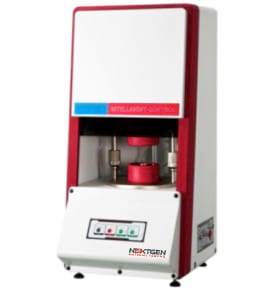
Mooney Viscosity Testing Machine - GenMooney
GenMooney is a viscosity testing machine is applied to measure the viscosity of the unmixed or mixed unvulcanized natural rubber, synthetic rubber and regenerated rubber .This tester has many functions such as fast warming, maintaining temperature, data stability, etc. It is equipped with an automated calibration feature for a simple data calibration of each experiment.
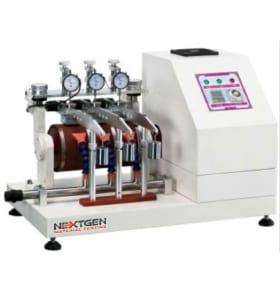
NBS Rubber Abrasion Tester - GenNBS
GenNBS is used to test the abrasion resistance of vulcanized rubber or other rubber compounds. It is commonly used for the soles and heels of footwear. It has an intelligent power failure recovery system. The unit conducts measurements through volumetric loss of specimens exposed to the action of a normalized abrasive medium secured to a rotations cylinder.
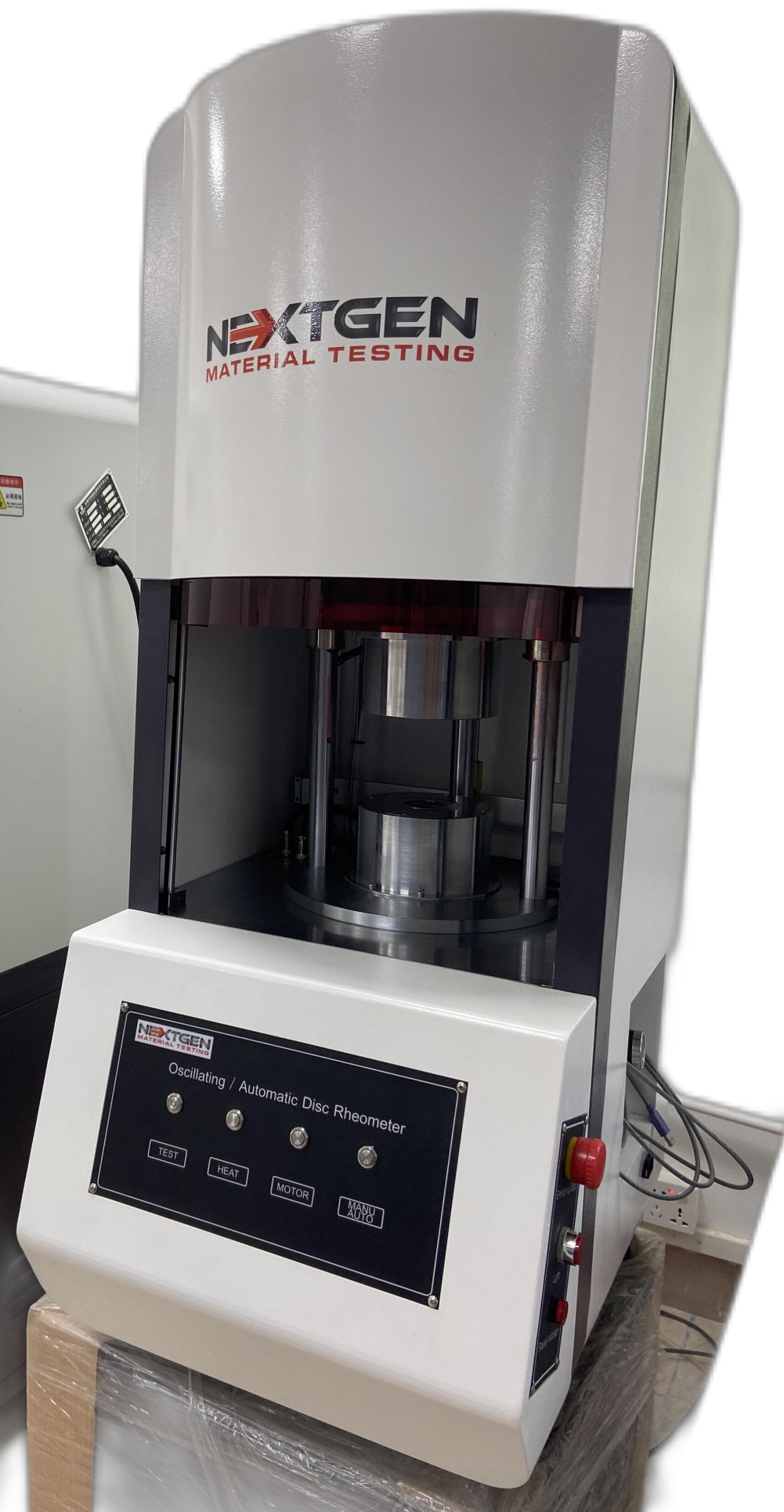
Oscillating / Automatic Disc Rheometer (ODR)
This machine is designed to get the characteristic curve and characteristic parameters of rubber vulcanization by measuring the applied moment of rubber to the oscillating dye body. NG-ODR rotor-free vulcameter has an excellent stability of results. The data and diagrams can be used as a reference for development, research and production quality.

Salt Spray Tester - GenSalt
GenSalt is designed to test the surface of different materials for resistance to corrosion. The unit is commonly used to test coated materials of a metallic nature in a controlled corrosive environment. The test can be used on rust-proof painting, anodizing, electroplating and rust-proof of grease. The machine imitates expedited corrosion process via salt spraying on a given test sample to identify the corrosion (oxides) resistance. Test results are based on the longevity of time a material can resist visible corrosion on the test sample.
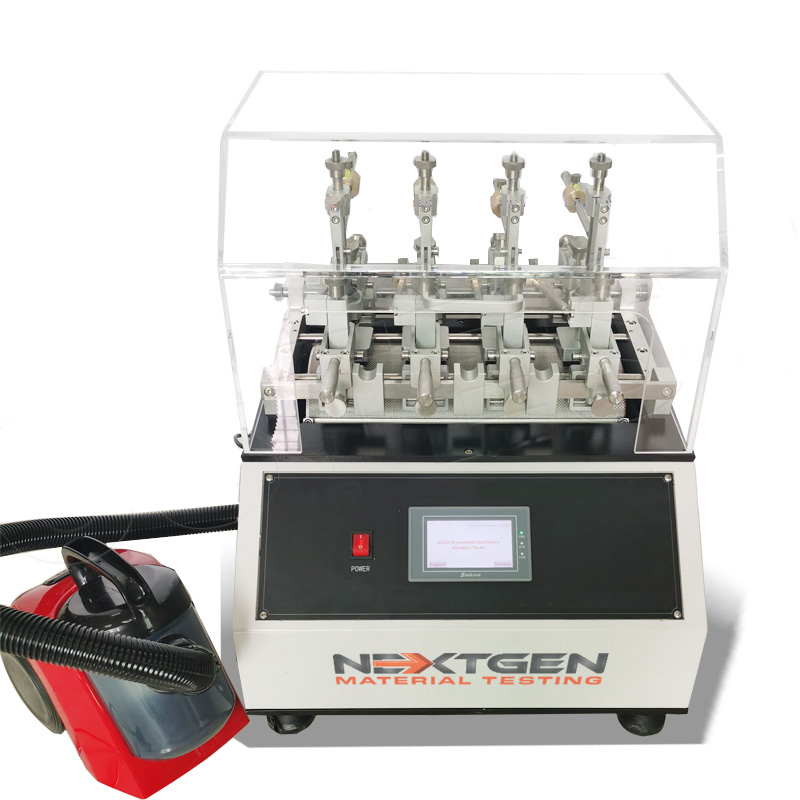
Wyzenbeek Abrasion Tester - GenWyze
The machine is designed to test the abrasion resistance of fabrics and metals. The abrasion of fabrics is tested when the specimen is pulled over the frame and rubbed against an abradant over a curved surface. The number of cycles, also known as double rubs, conducted on the specimen before the fabric shows visible wear is used to determine the rating of abrasion.

Vertical Rebound Resilience Tester - GenRebound
GenRebound tests the resilience of rubber compounds. The machine must be adjusted in a horizontal position and the plunger raised at a specific height. The plunger is then released onto the specimen for a given number of impacts. The measurements are based on the 4th, 5th, and 6th impacts. The average of the three (3) measurements is then calculated for the test result. The machine is highly useful in production of compounds designed to absorb vibration or shock according to the ASTM standards.
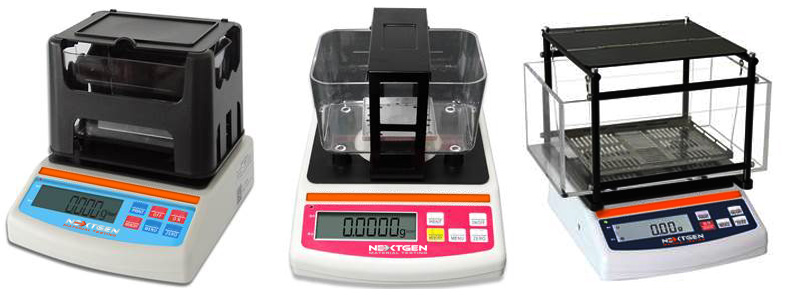
Digital Densimeter Systems
Description The NG-DM-A Series offers high-accuracy digital Densimeters designed for a wide variety of material testing needs. These elegant and compact densimeter systems offer capacity ranges from 150g to 3000g with accuracy of 0.001g/cm3 down to 0.0002g/cm3. Advanced Densimeter System […]
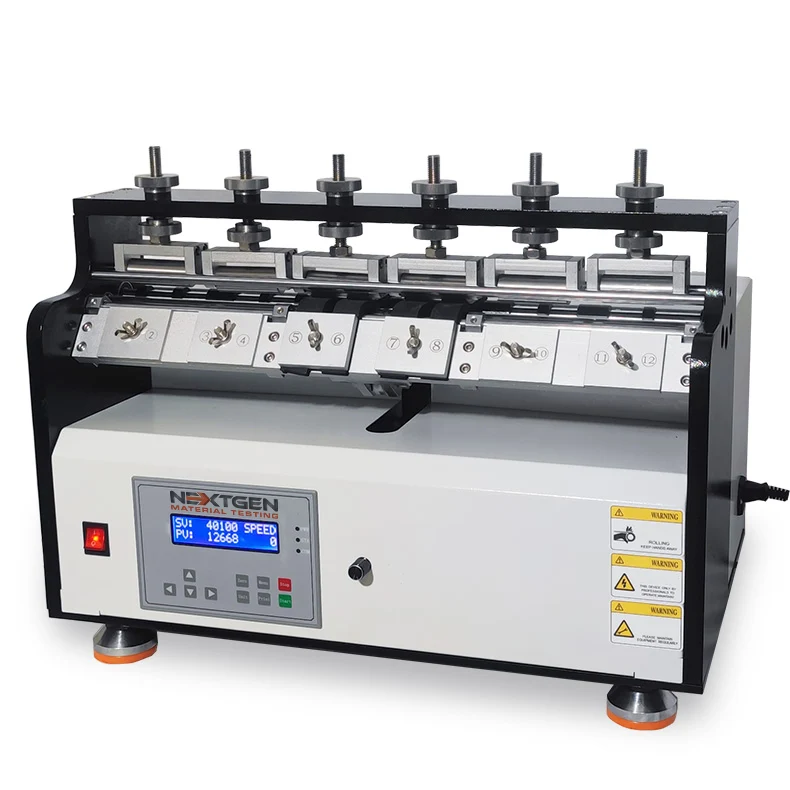
Ross Flex Tester
Ross Flex Tester is designed to determine the resistance of vulcanized or synthetic elastomers to cut growth. The system does so under continuously bend flexing in 90°.
